






























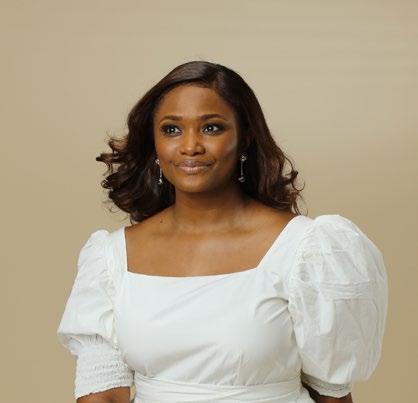
OnahNwachukwu Editor, THEWILL DOWNTOWN
Over time, Nollywood has grown remarkably and become a force to be reckoned with in the film industry. Nollywood actors have brought stories to life, taking the industry to new heights. Genoveva Umeh is one such actor. Although she started as a lawyer, she has gained prominence for acting by taking on roles in movies like Blood Sisters and Breath of Life. She has distinguished herself as an actor by bringing to life the characters she has taken on in different films. Umeh admits to being her happiest when performing in high school, so it was a no-brainer that she eventually went into acting. “I became passionate about acting in high school and discovered that I was happiest while performing.”
Scroll to pages 8 to 10 and read her story of going from law to acting as she shares insights into how she prepares for roles.




This week, our fashion pages share tips to help tall people look their best regardless of the occasion. See pages 4 and 5 for this.
Our food page, Bon Appetit, is here to make your life in the kitchen easier and more enjoyable. We’ve curated some practical cooking hacks that are sure to add a dash of fun to your culinary adventures. Scroll to page 11 for these game-changing tips.
Our beauty page discusses peptides, what they are, and how to incorporate them into our beauty regimen. It’s on page 12.
Downtown Confidential delves into the intriguing world of the five love languages and their profound impact on relationships. It’s a fascinating read that will leave you with a new perspective. Scroll to page 15 to learn more.
Don’t forget to click on the instructions below the QR codes on the movie review page to download our playlist.
Until next week, enjoy your read.







SUNDAY, JULY 14, 2024 THEWILL NEWSPAPER • www.thewillnews.com






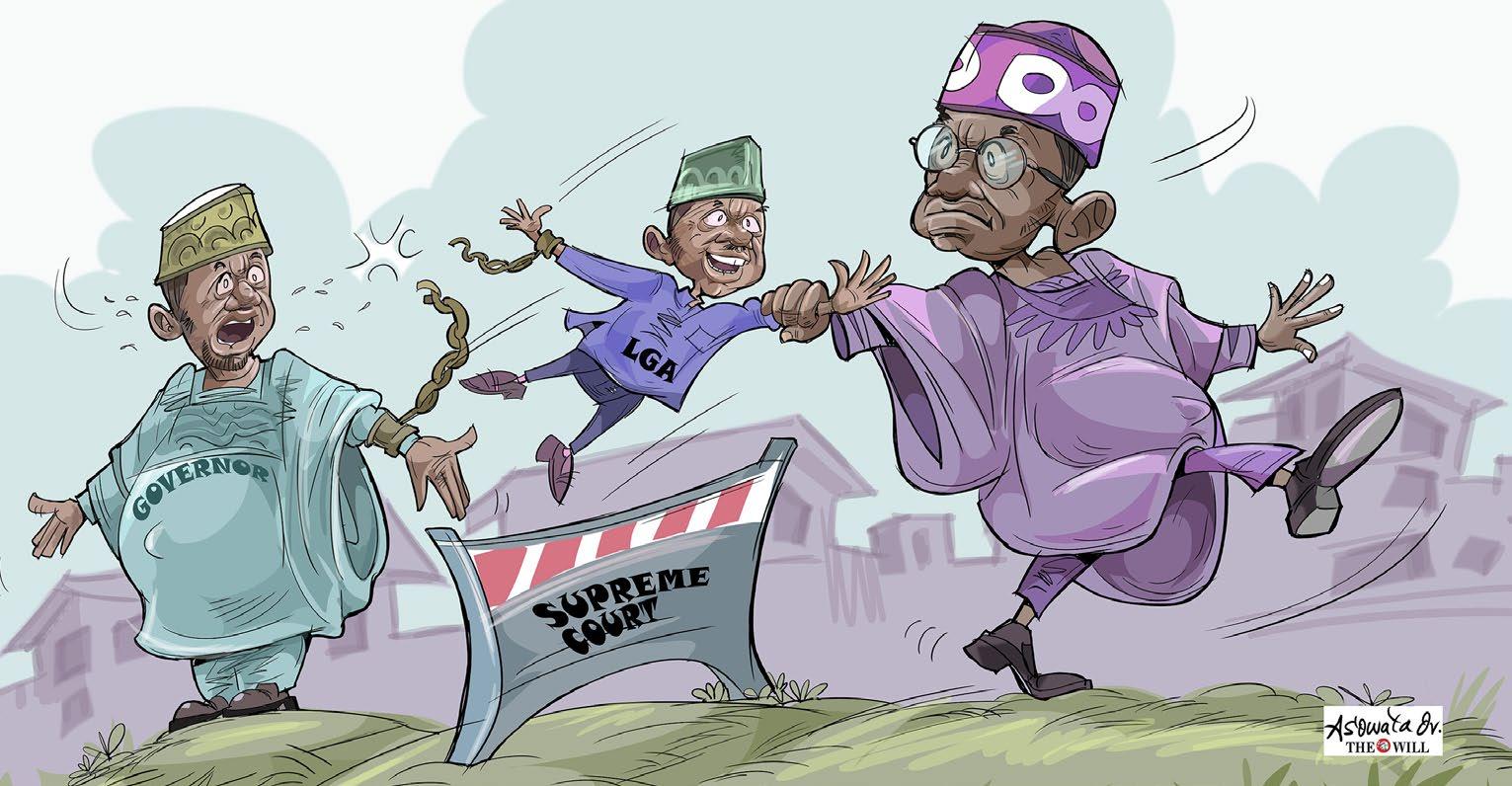
BY AMOS ESELE
Moments after news broke last Thursday that the Supreme Court had in a landmark ruling granted financial freedom and full administrative autonomy to local government areas in the country, several news outlets sought to interview a former Chairman of Ijebu-East Local Government Area of Ogun State, Wale Adedayo.
As LG chairman, until he had to resign under a cloud in August 2023, Mr Adedayo had publicly alleged that he received zero allocation from the State-Local Government Joint Account since 2021 and therefore could not execute campaign promises in the local government area.
The allegation, detailed in a letter to a former governor of the state, Segun Osoba and the Economic and Financial Crimes Commission, EFCC, set him on a collision course with the Governor Dapo Abiodun-led government, which denied the allegation and then petitioned the police. The latter initiated a criminal trial in court against Adedayo for, according to the petition, “deliberate circulation of falsehood, false report to government, threat to life and interference with the exercise of executive function.” Incidentally, the case came up for hearing at the Abeokuta Chief Magistrate Court on Friday, July 12, 2024. But the picture Adedayo painted in his allegation is familiar to discerning Nigerians, not the least former Coordinating
Minister of the Economy, Okonjo Iweala, who felt that an official way to handle the problem was to invite public scrutiny by publishing allocations from the Federation Account to the states and local government councils in select national newspapers monthly, but to no avail. The immediate past President of Nigeria, Muhammadu Buhari, signed an Executive Order in May 2020 granting local government areas financial autonomy until state governors swooped on him at the Presidential Villa and he gave up. Constitutional moves also failed to do the trick. In March 2022, when the ninth National Assembly forwarded 44 constitutional amendment bills to state Houses of Assembly for concurrence 35 of the bills were amended with notable exclusion of financial and administrative autonomy for local government councils.
That is why Adedayo thinks the recent apex court ruling may be the wand local government councils had been waiting for to make the desired impact in administration at the grassroots.
“The current federal administration headed by President Bola Tinubu appears ready to deepen the practice of democracy in Nigeria. Nigeria can never develop without an effective system of local government administration. And one of the reasons for the success of any government is availability of funds. Once these funds go directly to each local government, you will be amazed at the number of quality persons vying for positions at
the local government level. That will ensure that the rat race to get into state or federal positions will reduce. More eyes will be focused on happenings at both the state and local governments levels,” he told THEWILL in a brief interview on Thursday, after hurrying between television stations on that day to share his past experiences.
The Deputy National Publicity Secretary of the Conference of Nigeria Political Parties, CNPP, James Edema swore to THEWILL in his interview that “virtually all governors are tampering with the State-Local Government Joint Account. I am in the field, so I know what I am saying. The local government councils are just appendages of the state governors. This ruling will in the long run change things for good.”
Also, Professor of Developmental Studies at the University of Nigeria, Nsukka, Okey Ibeanu told this newspaper on Friday that the apex court ruling, “Is a star judgement. It is good for democracy.”
THEWILL recalls that before the Federal Government decided to take the matter up at the Supreme Court after such moves by Iweala and Buhari failed to turn the table on the governors, the apex court had made a similar ruling in the past which also


failed to make the desired impact.
In 2019, the apex court again ruled that local government areas without elected officials should not receive federal allocation. The ruling was a follow-up to a previous one in 2014 in which the court held that state governors lack the powers to sack elected council officials, both of which it reaffirmed in Section 7 (1) of the Constitution, which declares: “The system of local government by democratically elected local government councils is under this Constitution; and accordingly, the Government of every State shall, subject to section 8 of this Constitution, ensure their existence under a Law which provides for the establishment, structure, composition, finance and functions of such councils…”
Yet as of last Thursday's final judgement by the Supreme Court, 21 states have been systematically violating this provision of the Constitution. They are Anambra, Bauchi, Benue, Plateau, Abia, Enugu, Imo, Katsina, Kano, Sokoto, Yobe, Ondo, Osun, Delta, Akwa-Ibom, and Cross River. Others are Rivers, Sokoto, Zamfara, Kwara. Delta fixed its election for Saturday, July 11, 2024. Benue, which earlier chose July 6, 2024, has moved it to November.
For these renegade states, the excuses are insecurity, finance, political and legal battles with perceived or real rivals. While states in violence prone geopolitical zones like the North-East and North-West can be excused on the ground of insecurity, even though Adamawa in the North-East runs an elected local government system, just as five out of seven states in the insurgency-racked North-West, namely, Kano, Jigawa, Kaduna, Katsina and Kebbi (except Zamfara and Sokoto), have elected LGAs, many other defaulting states scattered across the other four geo-political zones are playing politics with the issue. This patent violation of these rulings by state governors compelled the Federal Government through the Attorney-General of the Federation and Minister of Justice, Lateef Fagbemi, a Senior Advocate of Nigeria, to file a suit marked SC/CV/343/2024, on May 20, 2024.
Seeking full autonomy for the 774 local government areas in Nigeria, the AGF prayed the apex court for an order of injunction restraining the governors, their agents and privies from receiving, spending or tampering with funds released from the Federation Account for the benefit of local government areas when no democratically elected local government system is put in place in the states.
The AGF prayed the court for an order permitting the funds standing in the credits of local governments to be directly channelled to them from the federation account, in line with the provisions of the Constitution.
The Federal Government further prayed for an order restraining governors from constituting caretaker committees to run the affairs of LGAs as against the Constitutionally recognised and guaranteed democratic system.
It also prayed the court for an order restraining the state governors from unilateral, arbitrary, and unlawful dissolution of democratically elected officials of local governments.
THE SUPREME COURT RULING
A seven-member panel of the apex court, led by Justice Mohammed Lawal Garba, declared as unconstitutional the state governors’ penchant for holding funds meant for local government administrations. It declared the act a clear violation of Section 162 of the 1999 Constitution, as amended.
According to Justice Emmanuel Agim, who read the lead judgement, 36 state governors of the federation are barred from further retaining or utilising funds that are meant for the 774 Local Government Areas in the country.
Justice Agim held that no House of Assembly of any state has the power to make laws that could, in any manner, interfere with monies meant for the LGAs.
“Demands of justice require a progressive interpretation of the law. It is the position of this court that the federation can pay allocations to the LGAs directly or pay them through the states. In this case, since paying them through states has not worked, justice of this case demands that LGA allocations from the federation account should henceforth be paid directly to the LGAs,” the Supreme Court ruled.
The court further declared as unconstitutional the appointment of caretaker committees by governors to run the affairs of the LGAs. It dismissed the preliminary objection by the state governors, contending the right of the Attorney- General of the Federation (AGF) and Minister of Justice, Lateef Fagbemi, to file the suit.
The court invoked sections 1, 4, 5, 7 and 14 of the Constitution to declare that the 36 state governors and the State Houses of Assembly are under obligation to ensure a democratic system at the third tier of government in Nigeria and to also invoke the same sections to hold that the governors cannot lawfully dissolve democratically elected local government councils.
They argued that "Nigeria, as a federation, was a creation of the 1999 Constitution, as amended, with the President, as Head of the Federal Executive Arm, swearing on oath to uphold and give effect to provisions of the Constitution.
Furthermore, they declared that the Nigerian Constitution recognises federal, state and local governments as three tiers of government and that the three recognised tiers of government are democratically elected and so can draw funds for their operation and functioning from the Federation Account created by the Constitution.
Reiterating that to put in place a non-existing democratically elected local government is to undermine the sanctity of the 1999 Constitution, they submitted that in the face of the violations of the 1999 Constitution, the Federal Government is not obligated under section 162 of the Constitution to pay any state funds standing to the credit of local governments where no democratically elected local government council is in place.
However, in separate preliminary objections filed before the apex court, the states sought the dismissal of the suit with substantial cost.
They contended that the AGF, who initiated the action on behalf of the Federal Government, lacked the locus standi (legal right) to do so and further alleged that the AGF breached their right to a fair hearing when he failed to serve them with a copy of a further affidavit he filed in support of the suit.
REACTIONS
The Nigeria Governors Forum, whose members seem to be at the receiving end since the judgement, said through its Chairman, Governor AbdulRahaman AbdulRazaq of Kwara State, that it will meet on Wednesday to make its position on the ruling known.
In the meantime, AbdulRazaq in Abuja on Friday in the company of his Bauchi and Imo State counterparts, Bala Mohammed and Hope Uzodimma, said the states’ Attorney-Generals would apply for the judgment and study it carefully, but in the interim, the governors “Are happy with the devolution of power, with respect to local government autonomy, It relieves the burden on governors. Our people really don’t know how much states expand in bailing out local government councils and that’s the issue there.”
My administration instituted this suit because of our unwavering belief that our people must have relief. Today’s judgement will ensure that it will be only those local officials elected by the people that will control the resources of the people. This judgement stands as a resounding affirmation that we can use legitimate means of redress to restructure our country and restructure our economy to make Nigeria a better place to live in and a fairer society for all of our people
An elated President Tinubu said, “My administration instituted this suit because of our unwavering belief that our people must have relief. Today’s judgement will ensure that it will be only those local officials elected by the people that will control the resources of the people. This judgement stands as a resounding affirmation that we can use legitimate means of redress to restructure our country and restructure our economy to make Nigeria a better place to live in and a fairer society for all of our people.”
A strident view came from ex-Governor James Ibori of Delta state, who stated on his X platform last Thursday that the court's ruling on “the matter is an assault on true federalism. The Federal Government has no right to interfere with the administration of local governments under any guise whatsoever. There are only two tiers of government in a federal system of government.”
Citing sections 163 (3) , which states that it is the National Assembly that shall prescribe the terms on how money in the federation account shall be distributed among the three tiers of government and section 6, which provides for State Joint Local Government Account, he added: “It is my sincere hope that the judgement delivered today will be reviewed at the earliest time possible because it stands the concept of federalism on its head.”
Professor Ibeanu doubts that what is at stake in the matter is the federal principle. He said that the Local government areas are under states under the law and not in a vacuum and that the law is the Constitution. He said, “Section 162 provides for two ways to transfer money to LG. The State Joint Local Government Account is not working properly because the money is being diverted and the court stated that this has to be redressed, which is the second way.”
Two Senior Advocates of Nigeria, Femi Falana and Mike Ozekhome think that the ruling is a giant leap forward for democratic governance in Nigeria.
Ozekhome said, “The judgement of the court is clear. If you want to receive funds from the Federation Account, then conduct an election. If what you have in place is a caretaker committee as local government chairman, be sure that it will not have money from the Federation Account. If you want money from the Federation Account, such councils must be democratically elected.
“Now, local governments would be expected to fix some schools, tar some roads, and even pay some workers. So, it is not that state governments will no longer participate in the affairs of the local governments, the state governments should create state economic councils and allow the local government to participate in them, just like they are part of the federal economic council,” said Falana, adding that, “The judgment has to be studied by the governors so that everybody will appreciate that what the Supreme Court has done is to promote public accountability at the grassroots levels.”
Prof Obienu called on the Federal Government to ensure that a clear principle is worked out for the disbursement of the allocation so that all local government councils know what is coming to them as all are not of the same size nor with the same responsibility.
He said, “While this judgment is a huge positive milestone in Nigeria's democratic development, its value will be completely lost if State Independent Electoral Commissions, SIECs, are not also "rescued" from state governors. SIECs are now their only remaining route to perpetuating the illegalities that the Supreme Court dealt with on Thursday. In the least, funding of SIECs must be charged to the Federation Account and released directly to them. The public must be involved in screening nominees by providing character references and the power of SIECs to hire and fire staff must be guaranteed.”
CNPP’s Edema calls for security agencies, Community based organisations and stakeholders to get involved in closely monitoring activities in the Local Governments henceforth. He dismissed the fear that the federal government would now be able to interfere in the affairs of the local governments, arguing that just as there were checks and balances at the federal and states, so too were there in the councils, which also have its legislative arms and make budgetary allocations.
National President of the Association of Local Governments in Nigeria, ALGON, and Chairman of Lafia Local Government Area in Nasarawa State, Maifata Aminu Mu’azu, summed it up on Friday: “The calibre of local government chairmen and women in Nigeria has improved over the years with two-thirds of them highly educated. With the new law on financial autonomy, all eyes will be on them. They know that unlike the governors, they have no form of immunity.”

The International Writers Association, IWA, has extended its heartfelt congratulations to Nobel Prize Laureate, Prof. Wole Soyinka, on the momentous occasion of his 90th birthday.
The body stated this significant milestone marks a lifetime of profound contributions to literature, drama, and human rights advocacy, and the IWA is honored to celebrate this literary giant.
International Writers Association, Acting President, Wole Adedoyin throughout his illustrious career, Prof. Soyinka has been a vocal advocate for human rights and democracy.
He said, “His fearless stance against tyranny and oppression has often put him at great personal risk, yet he remains undeterred in his mission to promote freedom and justice. His activism, combined with his literary prowess, makes him a unique and formidable force in both the literary and political arenas.
“The International Writers Association acknowledges Prof. Soyinka's role in championing the cause of writers and intellectuals across the globe. His unwavering dedication to the written word and his efforts to protect the rights of writers have set a high standard for literary activism. He has been a beacon of hope and a source of inspiration for countless writers striving to make a difference in the world.
As we celebrate Prof. Soyinka's 90th birthday, we also recognize the timeless relevance of his works. From plays like "Death and the King's Horseman" to novels such as "The Man Died: Prison Notes," his writings continue to provoke thought, challenge conventions, and inspire change. His ability to blend traditional African storytelling with contemporary themes has created a unique and enduring literary legacy.

He said the IWA International is proud to honour Prof. Soyinka not only for his literary achievements but also for his contributions to cultural exchange and understanding. His efforts to bridge cultural divides and foster dialogue among diverse communities have enriched the global literary landscape and promoted a greater appreciation of our shared humanity.
Kogi State Governor, Ahmed Usman Ododo has described the judgment of the Court of Appeal that upheld the decision of the governorship election petition tribunal affirming his return as the duly elected Governor of Kogi State as courageous and a welcome development in the judicial system.
Reacting to the appeal court judgment, Governor Ododo thanked the people of Kogi State for their support and expressed appreciation to the judiciary for the swift and expeditious manner with which it dealt with the appeal, adding that the court has again demonstrated that the mandate freely given to him by the people of the state cannot be upturned by persons who may not agree with the will of God and the majority of the people of Kogi state.
According to Governor Ododo:
“I give thanks to God for seeing us through this phase of the court processes and I thank the people of Kogi state for uniting behind our administration and the steps we are taking to serve our people to the best of our ability.
“The judgement of the Appeal Court reaffirms the fact that the November 2023 Governorship election in Kogi State was free, fair, peaceful, and credible.
“By the grace of God, our administration has become the symbol of peace and unity in our state and we are committed to serving our people on the basis of equity and inclusion.
“I thank the judiciary for staying true to its independence with this judgement of the Appeal Court that has reaffirmed the earlier decision of the Tribunal which is a clear testament that the mandate freely given to us by the people of Kogi State was done in the best interest of our state.”
He called on opposition politicians in the state to join him in advancing the development of the state, stressing that the judgement of the appeal court should now lay to rest the argument over the result of the 2023 governorship election and unite the people for the development of the state irrespective of political differences.
The Governor also expressed appreciation to President Bola Ahmed Tinubu for ensuring that the judiciary remains truly independent and transparent as the last hope of the common man in the country.
BY FELIX IFIJEH
Atwo-storey building housing Saints Academy School, located in Busa Buji, Jos North Local Government Area of Plateau State, collapsed on Friday morning, leaving many injured.
THEWILL gathered that the building collapsed on Friday, around 8:30 am when many of the students and teachers were already in classes.
The zonal coordinator, National Emergency Management Agency (NEMA), Eugene Nyelong, also said the number of casualties would be ascertained on completion of rescue operations.
While witnesses at the scene said the building trapped more than 70 pupils, at least 22 persons have been confirmed dead while several others as at press time on Saturday.
THEWILL further gathered that 26 people are receiving treatment at one of the hospitals, Our Lady of Apostles Hospital.
The Bingham Hospital has received seven bodies and is providing medical care for 16 injured people. Thirty-four injured persons are also being treated at the Plateau Specialist Hospital; two of them sustained spinal cord injuries.
The executive secretary of Plateau SEMA, Sunday Abdu, said emergency workers, supported by volunteers, security personnel, and members of the Red Cross, were at the scene for the rescue operation.
Commissioner for Information and Communication, Mr Musa Ashoms, said 200 students were in the building, writing their examination when it collapsed.
Ashoms, who visited the scene in the company of other commissioners, including that of secondary education, said the school had a total population of about 400.
The commissioner said part of the school that collapsed was accommodating about 200 students.
”The collapsed building has resulted in casualties, and injured students are still being evacuated to hospitals. We cannot however, ascertain the exact number of casualties until the evacuation is completed.
“The emergency workers are doing a lot in the rescue efforts.
The Governor, Caleb Mutfwang, has urged the medical personnel in the hospitals to ensure that they save the lives of survivors.
“They should not ask for money or anything because this is an emergency situation,” he said.
L-R: Anambra State Governor, Prrof. Charles Chukwuma Soludo; President Trade Union Congress, (TUC) Comrade Festus Osifo; President Nigeria Labour Congress, Comrade Joe Ajero and Minister of State for Labour and Employment, Nkeiruka Onyejeocha, after a meeting between President Bola Tinubu and leadership of organised Labour at the Presidential Villa in Abuja on July 11, 2024.

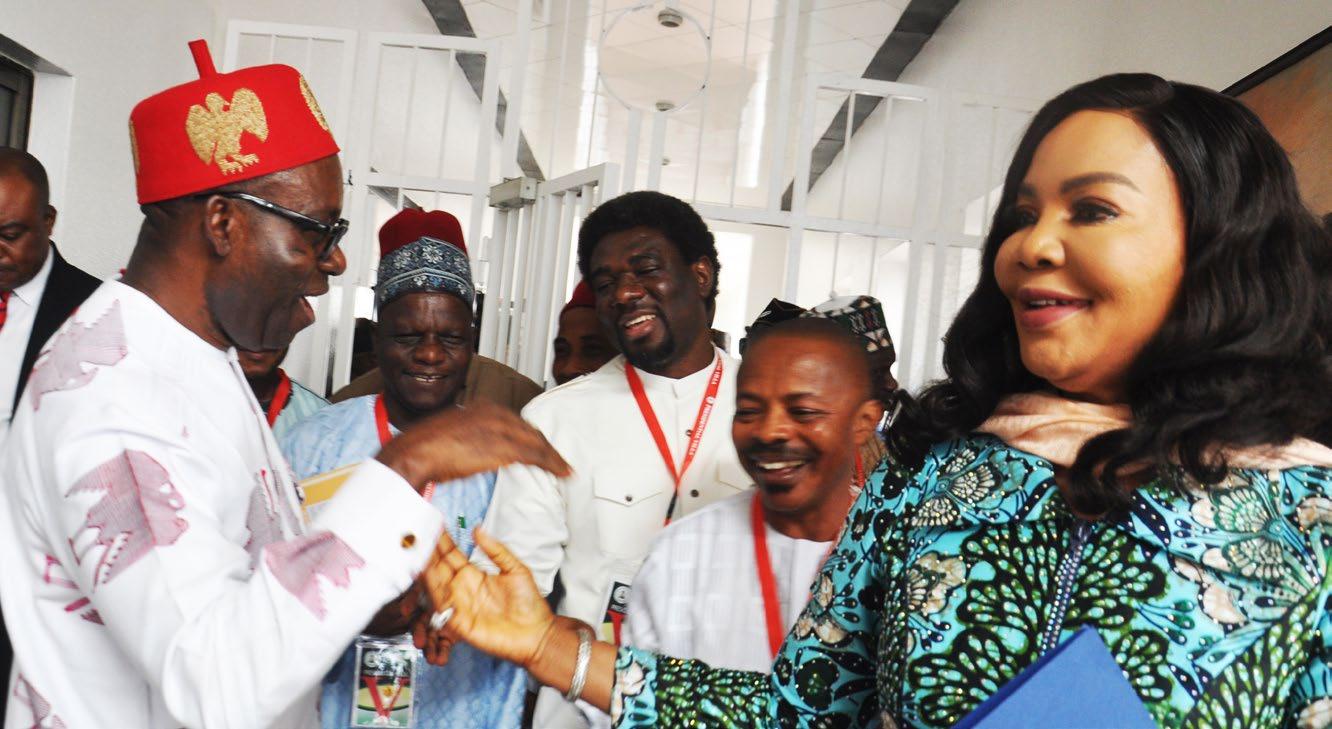
The security architecture of the Kogi State Governor, Alh. Ahmed Usman Ododo, has started to deliver as several bandits were neutralized when hunters stormed kidnappers’ hideout in Yagba West acting on credible intelligence to rescue victims. Last week, Governor Ahmed Usman Ododo distributed security kits to local hunters recruited by his administration, charging them to go after criminals and make Kogi safe. The trained hunters were able to rescue all the three kidnapped victims at the camp and some of the bandits escaped with gun wounds.
The Catholic Bishops Conference of Nigeria has called on the Federal Government to propose amendments to the Samoa Agreement or withdraw from the pact if the European Union rejects the proposed changes.
The statement was made available to the media by Rev. Fr. Michael Umoh, the National Director of Social Communications, Catholic Secretariat of Nigeria, on Thursday .
The Samoa Agreement signed on June 28, 2024 is an economic partnership between the European Union and African, Caribbean, and Pacific countries.
It addresses democracy, human rights, economic growth, climate change, social development, peace, security, and migration among the agreement partners drawn from African, the Caribbeans and European Union.
The Bishops in a statement titled Threat to the Sovereignty and Value of Nigeria in the Samoa Agreement issued by their President, Archbishop Lucius Ugorji, in Abuja, was made available to THEWILL
In it, they contend that the “treaty does not have a glossary of terms or a definition section to ensure that all parties have the same understanding of terms, which may pose a problem in its implementation and evaluation phases.”
It took exception to areas dealing with Gender equality, gender perspectives and gender mainstreaming; sexual and reproductive health rights, saying that “gender is no longer an innocent term as there are over 100 genders that would claim a stake in the term gender equality.”
CBCN argued that the agreement includes “post-modern secularistic ideologies” that undermine Nigeria’s moral, cultural, and religious beliefs.
As a way forward, the CBCN urged that the federal government to propose an insertion of a substantive article in the general Agreement and the African Regional Protocol, thus: “Nothing in this binding Agreement can be interpreted to include any obligation regarding sexual orientation, gender identity, comprehensive sexuality education, abortion contraception, legalisation of prostitution, samesex marriage or sexual “rights” for children.”
It said Nigeria should withdraw from the Agreement if the EU rejects the Amendment.

Addressing newsmen at Odo Ere, the headquarters of Yagba West Local Government Area, the State Commissioner for Information and Communications said the resolve of the Governor to stamp out criminality from Kogi State is total. He thanked the hunters for their gallantry, assuring them of the State Government support. The Transition Committee Chairman of Yagba West, Hon. Tosin Olokun said the hunters were able to achieve the feat with the help of credible intelligence.
He thanked the Governor for empowering and emboldening hunters across the state to combat crime, assuring the people of Yagba West of adequate security at all times. The rescued victims also narrated their ordeals in the hands of the Kidnappers, thanking the Local Government Chairman and the Governor for prioritizing security.
Justice Ijeoma Ojukwu of the Federal High Court sitting in Calabar has convicted and sentenced six internet fraudsters to six months imprisonment each for criminal impersonation, love scam and identity theft. Also in Onitsha, Justice Victoria Nwoye of the Anambra State High Court, sitting in Onitsha has convicted and sentenced the duo of Ikechukwu Obiekwe and Ugo Chukwudi to prison for fraud.
The convicts in Calabar are: Chibo Udoka (aka Zxoya Andric, Kelly Rose, Chimata Harry), John Inimfon Okpokpo ( Grace Boar),Emediong Ekerete Bassey (aka Thiwe Ploka), Otu Ginikachi Samuel (alias Chris Hemsworth), Goodluck John Bassey (aka Tom Jones) and Asogwa Ifebuche Lukas (alias Daniela Crystal). They were charged to court by the Uyo Zonal Directorate of the Economic and Financial Crimes Commission EFCC, on two-count separate charges, to which they pleaded guilty. The defendants pleaded guilty to the charges when they were read to them and based on their pleas, prosecution counsel, Khamis Mahmud prayed the court to convict and sentence them accordingly, but the defence counsels Udeme Tom, Innocent Ekeize and Henry Effiong prayed the court for lighter sentences for the defendants, on the ground that they were first time offenders.
After listening to both the prosecution and defence counsel, Justice Ojukwu, convicted and sentenced Emediong Bassey, Otu Samuel, Asogwa Lucas and John Okpokpo to six months imprisonment on each of the two count charges. The sentences are to run concurrently, while Goodluck Bassey and Chibo Mgborogwu were sentenced to six months jail term each on one count. The convicts were all given the option to pay a fine of N500,000 each. Four of the convicts were ordered to restitute the following sums: Emediong Bassey, R1500; Otu Samuel, N1, 000, 000.00; John Okpokpo, $150 US and Asogwa Lucas $100 US.. The six convicts forfeited all gadgets used in committing the crimes to the Federal Government.
The convicts were arrested in Uyo between May and June 2024, following verified intelligence regarding their criminal activities on the internet. In Onitsha, the suspects were prosecuted by the Enugu Zonal Directorate of the Economic and Financial Crimes Commission, EFCC on 10-count charges bordering on conspiracy, fraudulent conversion, stealing and retention of proceeds of crime to the tune of N39, 528, 530.
In the course of the trial, prosecution counsel, Mainforce Adaka Ekwu presented six witnesses and tendered several documents as evidence. Justice Nwoye in her judgment held that the prosecution proved its case beyond reasonable doubt and sentenced both men to one year imprisonment each without an option of fine. In addition, he ordered that the sum of N39, 528, 530, being the proceeds of their crime be forfeited by the convicts to their victim.
The convicts’ journey to jail began on May 19, 2019 when the victim through a petition to the Commission alleged that Obiekwe, who was his apprentice, diverted the sum of N39, 528, 530 from the company's sales account and when confronted he denied and absconded. Upon investigation by the Commission, it was discovered that Obiekwe used Chukwudi to divert the said sum to different accounts. The convicts were arraigned in December 2019.
BY FELIX IFIJEH
Afew weeks after President Bola Tinubu hinted in his June 12, 2024 Democracy Day address that he would n propose an executive bill to the National Assembly on the new minimum wage, another round of talks with organised labour leaders started all over again last week.
The Federal Government had settled for N62,000 after several negotiations had taken place between labour leaders and a Tripartite Committee set up by the President to negotiate a new minimum wage as the 2019 wage which made N30,000 minimum wage expired in April 2024. The committee is composed of the Organised Labour, representatives of federal and state governments as well as the Organised Private Sector
Two weeks after Tinubu’s Democracy Day speech, the Federal Executive Council, FEC, chaired by the President stepped down from consideration and deliberation on the memo on the new minimum wage to allow for more consultation, especially as organise labour stood their grounds on their own version of minimum wage of N250,000n from N467,000 which they earlier proposed.
THEWILL learnt that Tinubu had to meet with labour as a final move before submitting his proposed executive bill to the National Assembly. The idea is that once the supportive lawmakers pass the bill and it becomes law, it would be binding on every partner to the negotiations. So far, only the labour leaders beside organised private sector and state governments, are yet to agree to the new wage with the proposal of the Federal Government.
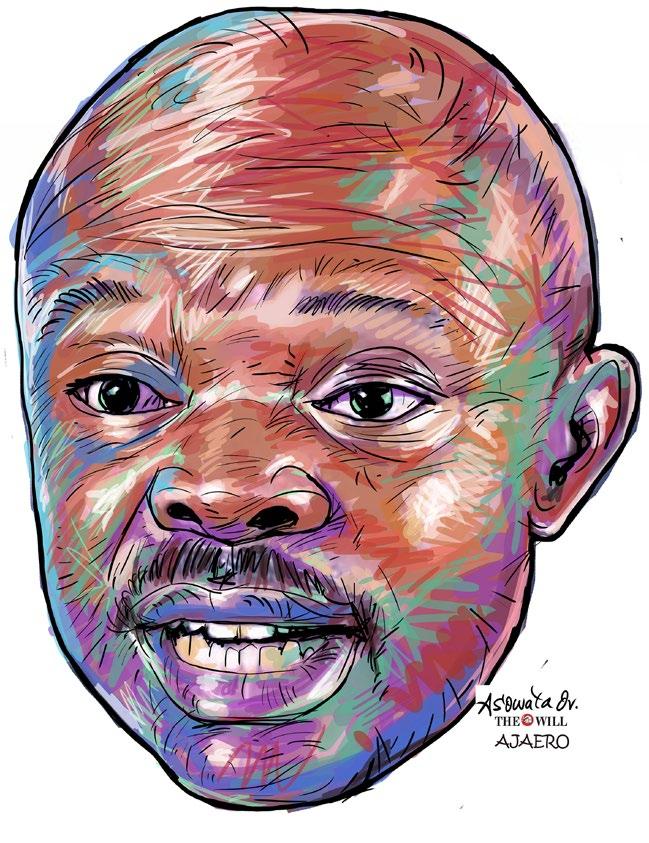
Once passed, the Act would take another mandatory five years for review to meet contemporary economic demands of workers.
Speaking on this, the Chairman of the Senate Committee on Media and Public Affairs, Senator Yemi Adaramodu, said that sanctions are likely to be meted out for noncompliance with the bill once it becomes an Act.
Adaramodu said, “We are going to do a watertight bill that we are proposing that the president will sign to ensure that it is strictly adhered to as a law.
He explained that the issue of a minimum wage should not be looked at as one involving only the Federal Government because every employer of labour from the public to the private is involved.
The federal lawmaker urged the Nigeria Labour Congress to look beyond the federal level in its agitation for better conditions of work.
He said, “We don’t even talk about the sub-nationals. And then it behoves on the NLC, which recognises the workers in the organised private sector and the sub-nationals to look at the NLC that recognises them as their members, to even ensure that they advocate for them.
But for organised labour, comprising the Nigeria Labour Congress (NLC) and Trade Union Congress (TUC), the minimum wage should be N250,000.
NLC President, Comrade Joe Ajaero, made this known to State House Correspondents, after a meeting with President Bola Tinubu on Thursday, at the Presidential Villa, Abuja.
Speaking further on Thursday, in Abuja, Ajaero told State House Correspondents that the engagement with the President is expected to resume this week.
While the details of the discussions were not disclosed, TUC President, Festus Osifo, said labour explained its position to the President.
For President Tinubu however, Nigerian workers deserve improved welfare, better wages, as well as safe and enhanced working conditions as the driving force of the nation.
Speaking with the leadership of the Nigeria Labour Congress (NLC) led by Comrade Joe Ajaero and that of the Trade Union Congress of Nigeria (TUC) led by Comrade Festus Osifo, on Thursday in Abuja, President Tinubu said he was concerned about the welfare of Nigerian workers and that his administration is prioritising their concerns.
“I pay attention to everything around me. A happy worker is a productive worker. And society depends on the productivity of the happy worker,” presidential spokesperson, Ajuru Ngelale quoted the President as saying.
The President, Ngelale said, called for realistic expectations as regards the minimum wage question, stating: “You have to cut your coat according to available cloth. Before we can finalise on the minimum wage process, we have to look at the structure.”
“Why must we adjust wages every five years? Why not two? Why not three years? What is a problem today, can be eased up tomorrow. There is much dynamism to this process if we are not myopic in our approaches. We can take a surgical approach that is based on pragmatism and a deep understanding of all factors.”
Responding, Ajaero said, “Between living wage and minimum wage, we need to find a balance. Things are difficult for the Nigerian worker.”
The TUC President, Comrade Osifo, said inflation has adversely affected the value of the naira and that the measures initiated by the government to address the rising cost of food and transportation need to kick in to give citizens relief.
“
In the real sense, it wasn’t a negotiation, but a discussion and we have had that discussion. We agreed to look at the real terms probably and reconvene in the next week. So that’s where we are because we didn’t go down there to talk naira and kobo. At least, there were some basic issues that we agreed on
He said the rollout of Compressed Natural Gas-powered buses will help in checking the high cost of transportation, while the recent directive on the suspension of duty on certain food imports will bring down the prices of food items, if properly implemented.
Curiously, Ajaero however, said that “Naira and Kobo,” was not part of their discussion with the President, adding that the status quo remained as per the proposals of N250,000 and N62,000.
“In the real sense, it wasn’t a negotiation, but a discussion and we have had that discussion. We agreed to look at the real terms probably and reconvene in the next week.
“So that’s where we are because we didn’t go down there to talk naira and kobo. At least, there were some basic issues that we agreed on,” he said.
On the N250,000 demanded by the NLC, the labour leader said, “I remember mentioning that we didn’t go into naira and kobo discussion. Now the status quo in terms of the amount N250,000 and N62,000 remains until we finish this conversation.”
On his part, the Trade Union Congress President, Comrade Osifo said that the organized labour put all the economic indices on the table and how it was biting on Nigerians.
He said, “In the meeting we tried to put the issues on the table. Issues that are bordering and biting Nigerians today, the economic difficulties and the value of naira, how it has also eroded, how these have affected the prices of commodities and goods in the market.
“So, we tried to put these before Mr President because he is the President of the country and the bulk stops at his table.
“We have had all the conversations with all his agents, but today (Thursday) we said let us meet with the father of the country and have this conversation and make the argument that Labour always make.
“We made all the arguments, the economic analysis, macro, micro, fiscal and monetary issues. so we put everything forward and at the end, the President made his remark as the President and we all agreed. Let's go back to internalize it, have some conversations and in one week time, we will come back and we will continue the meeting.”
On their part, the 36 state governors have said they should be allowed to pay what each state can afford.

That IPU report stated that the challenges include gatekeeping by political parties, high candidate registration fees, the inconvenient scheduling of political meetings, the high cost of electoral campaigns, political violence and sexual harassment, clientelism (and, therefore, dependence on narrow networks of men), a ban on independent candidacies and patriarchal social norms
The proposed bill to create 74 seats for women in the parliament has once again re-echoed the several failed attempts in the country to follow through with the mandatory protocol on women inclusiveness in the political process. The bill, which is being jointly sponsored by the Deputy Speaker of the Federal House of Representatives, Benjamin Kalu and 12 others seeks to create one senatorial seat and one House of Representatives seat in each state and the Federal Capital Territory, FCT.
The bill seeks to amend Sections 48 and 49 of the Constitution to provide one special seat reserved exclusively for women in the Senate and House of Representatives for each state of the federation and the FCT, effective after the end of the current National Assembly and subject to review every 16 years.
Also, it seeks to amend Section 91 of the law to provide three special seats reserved exclusively for women in the House of Assembly of each state of the federation, which shall be spread across the three senatorial districts of each state.
Disappointingly, the bill which had passed second reading at the House had to be stepped down because of stiff opposition from naysayers.
Of all the arguments for and against the bill – gender equality and fair representation, as well as gender bias and unconstitutionality, the crucial point as pointed out by Minority Leader, Kingsley Chinda, is that Nigeria ranks the least country in terms of gender representation in Africa and so, there is a need to address the gap through the proposed legislation.
Indeed, in its March 2024 report, titled ‘Women in Parliament’ the InterParliamentary Union noted, “Nigeria ranked among the bottom five countries
globally for women’s representation in parliament.”
Interestingly, Rwanda led the world ranking with women accounting for 61.3 percent of seats in the parliament followed by Cuba and Nicaragua with 55.7 percent and 53.9 per cent, respectively.
“Across the 13 countries that held renewals in 2023, the highest shares of women elected to parliament were recorded in the upper chambers of Zimbabwe (45 per cent) and Eswatini (43.3 per cent).
“In Sierra Leone, a total of 41 women were returned to parliament across the 135 seats that were up for election, representing 30.4 per cent of directly elected MPs following the renewal.
In Benin, 28 women were elected to parliament, a historic high for the country.
At the beginning of 2023, noted the report, Benin ranked 169th in the world in terms of women’s parliamentary representation. By the end of the year, it had moved up to 87th position. In 2023, nearly 46 percent of the national Parliamentary seats in South Africa were occupied by women.”
By sharp contrast, Nigeria elected the least gender-representative parliament in the region, with women making up only 2.8 per cent of MPs in the upper chamber and 3.9 per cent of MPs in the lower chamber, following the 2023 polls. These few examples are products of legislation by the mentioned countries.
Sierra Leone, for example in January 2023 enacted the Gender Equality and Women’s Empowerment Act, which introduced a mandatory 30 per cent quota for women among elected candidates. The result, as mentioned earlier, was a dramatic increase in women representation in the country's parliament in the polls held in that year.
The reaction from the House of Representatives is not altogether surprising. We recall that a similar reaction greeted a bill seeking equal rights for women, men and persons living with disabilities at the Senate in March 2023.
Sponsored by Senator Biodun Olujimi, the bill was introduced in 2021, but it was frustrated by some senators who objected that it was against the Islamic perspective and some socio-cultural norms. In its reincarnation in 2023, the bill also succeeded in passing second reading. Without listing the many signed instruments by Nigeria, from the 2015 Beijing Conference on Women Rights to the National Gender Policy launched in 2006 to provide guidelines for mainstreaming gender in various sectors of the economy with the overall goal of reducing gender inequalities and enhancing participation of women, men, girls and boys in socio-economic and political development, we urge the opposing lawmakers to rethink their stand.
Nigerian women are prevented from participating in politics because of institutional and social and economic factors. That IPU report stated that the challenges include gatekeeping by political parties, high candidate registration fees, the inconvenient scheduling of political meetings, the high cost of electoral campaigns, political violence and sexual harassment, clientelism (and, therefore, dependence on narrow networks of men), a ban on independent candidacies and patriarchal social norms.
We agree that these are the issues that should inform the reasons for the bill seeking to reserve seats for women in politics. Any other reason is impolitic.
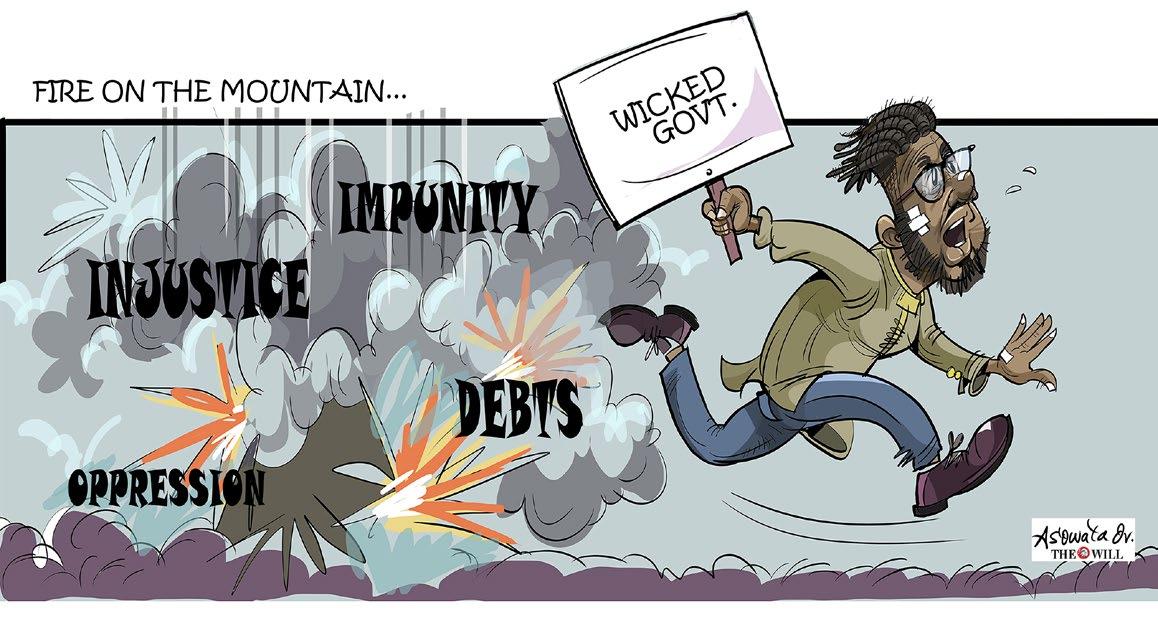

BY OSARO OKHOMINA
n 2022, when the Bayelsa State Government under Governor Douye Diri kick-started the local government reforms, targeted at improving grassroots governance, many Nigerians were sceptical.
With the records of great firsts in the areas of improved infrastructure, prompt payment of salaries and pensions, probity and accountability and savings by local government councils in the state, many have come to agree that local government administration can work if properly guided.
WITH GOVERNOR DOUYE DIRI’S INTERVENTION, THE ERA OF INEFFICIENCY, CORRUPTION AND NON-PERFORMANCE ASSOCIATED WITH LOCAL GOVERNMENT ADMINISTRATION IN BAYELSA IS GONE
A look at the last set of local government administrators and the current elected local government leaders and rural development authorities showed that the stories of local government administration in Bayelsa State have changed for good and indeed, local government councils are working!
With Governor Douye Diri’s intervention, the era of inefficiency, corruption and nonperformance associated with local government administration is gone.
The governor, through proper supervision by his amiable Deputy, Senator Lawrence Ewhrudjakpo, has redefined LG administration. And it is visible to all in the state and beyond. The Prosperity administration has ensured that local government funds remained exclusive for running of the respective councils, including regular payment of salaries and project execution. It is on record that the last caretaker administration left office and ensured that local government administration started on a good footing under the newly elected council officials. The introduction of the Rural Development Areas (RDA) by the state government has further deepened development and taken governance to the door steps of the rural communities of the state.
Tcouncils to initiate developmental projects, Governor Diri took a drastic step to change the narrative. Before the staff verification at the local government level, the state government had to set aside certain funds monthly to support the salaries of workers in some of the council areas. From Yenagoa to Brass, Ekeremor, Ogbia, Nembe, Kolokuma/Opokuma, Sagbama and Southern Ijaw Local Government Areas, it has been a harvest of projects with commissioning across the LGAs by Governor Diri.
The same story is being told across the Eight Local Government Councils and Rural Development Areas. Sharing his formula with Former Governor of Delta State, Chief James Ibori, during a recent visit to Bayelsa State, Gov Douye Diri noted that his administration has been very transparent in the management of local government funds since he assumed office.
According to him, despite the anomaly and imbalance in the Federal system of governance in the country, his administration has ensured that the local government administration is working and supported to deliver on grassroots infrastructure, savings and performance. Diri pointed out that his administration has assisted in reforming local government administration and not destroying it as argued in some quarters against state governors.
"We came and we saw that the local government councils were even unable to pay salaries and we brought out measures as a government. My Deputy Governor was directly in charge of it when those measures were introduced."
"We discovered that it worked. Most local government councils can pay salaries today and they have savings. They do not only pay salaries but also pay now with ease. They are also heading into infrastructural development. And where they are unable to pay salaries, the state augments them. So, if you say the state governors are the ones eating local government money, I am very sure it is not in Bayelsa State, by extension maybe not in South-South states." Governor Diri has equally inaugurated some projects, including a road and park in Kaiama executed by the then Chairman of Kolokuma/ Opokuma local government area.
In Southern Ijaw Local Government Area, an elated Governor Diri inaugurated the executive chairman's office complex, a 300,000-litre water scheme, a concrete road, a town hall in Amassoma community and a 500-seating capacity hall at the council's headquarters in Oporoma town executed by then chairman, Chief Kia Nigeria. Indeed, in Bayelsa today under the Prosperity Government, it is a new season, a new development in the management of the local government system. Truly, it is no longer business as usual!
BY IFEANYI IZEZE
he Kenya Finance Bill protests, widely known by the hashtag #RejectFinanceBill2024, was a series of decentralised mass protests in Kenya against tax increases proposed by the country’s government in the Finance Bill, including tax on bread and what was called “eco tax”.
The hashtag #REJECTFINANCEBILL2024 gained prominence over the weekend of June 15, with many calling for protests to press their case. On June 18, ahead of the Finance Bill’s second reading in Kenyan parliament, thousands of people took to the streets. The protesters called for a nationwide street action to urge legislators to rethink. While it is encouraging that the Kenyan President, William Ruto, offered a string of concessions to defuse tensions, in its initial response, the government veered between repression and accommodation. As unemployment remains high and prices of essential goods rise, there was an outrage over the luxurious lives of the President and other senior government officials, just as we have in Nigeria.
Grilled on live television on 30th June, Ruto said he had heard the protesters’ demands for fundamental changes in the management of public funds and promising budget cuts on travel and hospitality for his office in line with some protesters’ demands. He also promised to scrap unpopular budget lines, such as funds dedicated for use by the President’s and deputy president’s spouses.
As he said, “Authorities would consider a ban on public fundraisers (known in Kenya as harambees), where politicians make large cash donations ostensibly to support social causes. Critics view these events as occasions for politicians to dole out dubiously acquired funds as a form of political patronage. However, the Kenyan President could not offer a clear timeline for carrying out the cost-cutting measures and other reforms he has promised, given widespread scepticism about his sincerity.
The government’s stepping in with a national address to explain what went wrong and what should be done to halt further degeneration of the already bad situation had some clear lines that are rare in the manner with which Nigerian government officials respond to genuine agitations by the citizenry. Three takeaways are obvious from the Kenyan Government statement as delivered by Vice President Rigathy Gachagua, who stood in for his boss, President Ruto.
First, it was noteworthy that rather than take the diversionary route of blaming the failure of intelligence like we often do in Nigeria, the Kenyan Vice President was very specific in holding the head of their Intelligence Agency accountable. This is a pure contrast of Nigeria’s repeated failure to sanction heads of security agencies, including military and police commanders for embarrassing security breaches, kidnapping, banditry and other terrorists’ attacks recorded under their watch. There is hardly any doubt that the Kenyan Government will sanction the head of the security agency and many more persons that will be identified as unfits. If roles were to be reversed, you would by now have seen the clueless heads of Nigerian security agencies, military and police commanders with their retinue of staff blaring sirens around town.
In fact, some of them would have been visiting scenes of the security breaches like we saw after the Abuja-Kaduna train attack or the Kuje Prison attack. Everybody would have blamed the failure of Intelligence without pointing a finger at anybody. Besides the security operatives (at every level), the DPO, Area Commander, Commissioner of Police and the designated military Unit or Formation Commanders in whose Area of Responsibility (AoR) the breach occurred would have all walked away without any sanctions or consequences. It does not happen that way in other countries. It is always either those responsible throw-in the towel by resigning or are shown the way out.
In a deliberate move to restore financial order, streamline the recurrent expenditures and get the *Continues online at www.
Secondly, the Kenyan Vice President did not stop at holding the head of the national security accountable, he went further to highlight the ills of the agency. He was very clear that mediocrity had taken over SUNDAY, JULY 14, 2024

merit, a classical drawback of the entire Nigerian security architecture. Security business is not an all-comers’ affairs. A situation where thorough bred professionals are sidelined for political or ethnic expediency always spell doom for security business. There are too many dead woods in our security architecture. These people are too well known, but nobody dares to call them out like the Kenyan Vice President did. You will not believe that despite the pressing security challenges we are facing; not one DPO has a contingency plan on how to checkmate breaches or how to contain or react to a breach with a quick-action response.
NOW IN NIGERIA, A LIKELY FIERCE NATIONWIDE PROTEST IS BREWING IN OUR SETTING AND ITS PUBLICITY AND RECRUITMENT CAMPAIGN IS SPREADING LIKE WILDFIRE ON THE INTERNET. TAGGED “#ENDBGIN”, THE PROPOSED NATIONWIDE CIVIL DISOBEDIENCE IS BEING PROPELLED BY YOUNG NIGERIANS WHO ARE FEELING DISAPPOINTED AND BETRAYED BY THE GOVERNMENT IN THE MANNER THEY HAVE RUN THE AFFAIRS OF THE NATION WITHOUT DUE THOUGHT ON THE WELFARE AND WELL-BEING OF THE CITIZENS
Thirdly, the vituperations of the Vice President must also be viewed as an attempt to shift blames, which is very typical of African leaders (rulers). It is a well thought-out reaction to douse the heat and take some pressure off the government. Security operatives are not decision makers, so they cannot take all the blames for the Finance Bill that triggered the Kenyan civil disobedience. The government should tell the world why President Ruto did not properly assess the policy before contemplating the roll out. His expression of anger at the dereliction of duty on the part of security operatives is ‘damage control’ at its very best. The government, just like the security agency, has a share of the blames. Of course, we all know too well that government/ leaders in our continent are never wrong.
The background given should serve as a huge lesson to President Bola Tinubu and those running the Nigerian Government with him. The tension in this country is building up to boiling point and we have to watch it because it’s almost at that point and the Kenyan incident would be a child’s play if it happens here. Can anyone boldly and convincingly say that President Tinubu has been thoroughly assessing anticipated negative impacts of his “policies of hardship” before rolling them out and enforcing same down the throats of the ordinary Nigerians that can no longer breathe as rightly remarked by the flippant Senate President, Godswill Akpabio?


Nigeria’s pension asset continues to increase notwithstanding the high rate of contributors’ withdrawal, In May 2024, the Nigerian pension industry maintained its uptrend, reaching an all-time high of N20.23 trillion. This marks an impressive N4.12 trillion increase over the past year.
Data from the National Pension Commission (PenCom) indicates that the total pension assets in the industry surged to N20.23 trillion in May 2024, up from N16.11 trillion in May 2023, representing a 25.6 per cent year-on-year increase.
Compared to the previous month, the asset value increased by 2.23 per cent from the N19.79 trillion recorded as of the previous month.
The increase in the industry’s assets under management can be attributed to the growing adoption and acceptance of pension schemes by Nigerians and the high yields on investments.
Additionally, the number of total pension registrations saw a year-overyear increase of 3.2%, rising from 9.99 million in May 2023 to 10.32 million in May 2024.
The RSA II, which is a balanced and default fund for RSA holders of 49 years and below, accounted for most of the asset value. Notably, RSA Fund II accounted for 41.7 per cent of the assets, followed by Fund III with a contribution of 26.4 per cent. Investments in equities increased by N771.7 billion between May 2023 to date, currently at N1.89 trillion and accounting for 9.4 per cent of the total pension assets.
Continues on page
EDITOR Sam Diala


The Nigeria Inter-Bank Settlement System (NIBSS) is engaged in a silent revolution of the financial services sector through its mandate which focuses on problem-solving initiatives. The far-reaching impact underlying the labyrinth of its activities will expand the e-banking revenue of relevant entities and, also, boost financial inclusion –two major areas of consideration.
This is because NIBBS, as an enabler, focuses on continuous improvement and innovation as the core of its problem-solving mandate. The global demand for its services creates no room for campaign or strategic media visibility. This is considered a distraction to an organisation that does not play in the league of fast-moving consumer goods firms engaged in household sachet consumptions.
According to the Managing Director/CEO, Premier Oiwoh, NIBBS upgrades its systems continuously. A reason for this is that the NIBSS was established to carry on business as a serviceoriented institution providing mechanism for problem-solving innovations.
He explained that with 65 million Bank Verification Numbers (BVN) holders enjoying the products offered by the financial services institutions, NIBSS plays a major role in facilitating the technology-based innovations that make for seamless financial transactions.
This is in line with part of its mandate: “To provide infrastructure for the automated processing and settlement of transactions between banks acting on their own account as regards deposit placements, Treasury Bills Transaction, Naira settlement on
inter-bank foreign exchange transactions.”
“NIBBS is a silent trail-blazer in the modern financial services industry supporting the technological revolution that has transformed the banking landscape. They have made us forget that up-country cheque clearing took 21 working days while domestic clearing required 14 working days,” said Tony Akalonu, a retired bank executive now into consulting service.
Shielded from the prying eye of the public at its serene base overlooking the popular Bar Beach in Victoria Island, Lagos, NIBSS houses amazingly sophisticated facilities that pass human understanding.
The young workforce – from management team to the lowest member of staff - exude extraordinary aura of clinical concentration to the screen of their computer laptops in the cool and quiet paperless office environment that operates every moment of the day and night.
There are screens monitoring real time performance of the financial services institutions’ systems - downtime, network connectivity, POS and others ICT-related workings.
“When we notice such disruption, we call the bank concerned to know the cause and what they are doing about it, because there should be no service obstruction, every second counts”, Oiwoh said, while explaining the functions of the monitoring gadgets strategically placed in different units.
Oiwoh said NIBSS is working towards a totally biometric system
that the fingertip would play the role of cards because our focus is continuous upgrade of existing facilities.
Corporate debt securities also increased by N466.26 billion during the period, having attracted about N2.19 trillion as of the end of May 202
We will continually remain in our creative thinking because technology is about creating value, and collaboration is the key
“We are working to make Nigeria work; hence NIBSS must guarantee Nigeria’s efficient payment system. We will continually remain in our creative thinking because technology is about creating value, and collaboration is the key”, the NIBSS boss told visitors to the facility.
The Federal Government and the banks have benefitted from the revolution in the financial services industry through taxes, levies, fees and commissions.
The government collected N49.5 billion from Electronic Transfer Levies in Q1 2024. Typically, EMTL is levied on transactions conducted via platforms, such as mobile money, internet banking, and other electronic payment methods. It applies to all electronic transfers of funds placed in a Nigerian-licensed bank or financial institution. Similarly, the banks have recorded significant revenue increase through their e-banking activities which is promoted by NIBSS.
Analysis of the FY 2023 financial statements of the Tier-1 group in their Holco structures, revealed that the Big Five generated a total of N385.85 billion in e-banking revenue as against N277.14 billion in 2022, representing a 40 percent increase.
UBA earned the highest e-banking income among the Tier-1 financial services institutions. The bank generated N125.57 billion in 2023 representing 32.5 percent of the Tier-1 group total income for the year.
By this, Africa’s Global Bank grew its e-banking income by 59 percent when compared with N75.94 billion it earned in 2022 to emerge the first in 2023, followed by Access Bank which recorded N101.61 billion against N59.65 billion in the previous year, accounting for a 70.34 percent rise.
First Bank grew its e-banking income by 20 perent to N66 billion in 2023 from N55 billion in the preceding year, ranking it the third among the Big-Five group. It was followed by Zenith Bank with e-banking revenue of N51.81 billion compared to N45.73 billion in the preceding year, representing a growth of 13.3 percent.
The financial statements of Guaranty Trust Bank revealed that the 34-year-old bank recorded N40.82 billion as e-banking income in 2023, against N31.73 billion in 2022, constituting a 28.6 percent increase.
The Q1 2024 financial statements of the Tier-1 group (excluding FirstBank of Nigeria) amounted to N108.95 billion against N64.32 billion or 70 percent increase and followed the same performance trend by the major banks.
UBA’s N44.35 billion e-banking revenue in Q1 2024 representing 60 percent of the total e-banking income by the four Tier-1 banks was the highest during the period. It was followed by Access Bank which recorded N33.38 billion, while Zenith Bank and Guaranty Trust Bank earned e-banking income of N19.96 billion and N11.26 billion respectively.
The remarkable increase in e-banking revenue of the banks shows the high level of interest in alternative payment system by bank customers as the CBN pushes for expansion in financial inclusion across the country.
A notable aspect of the growth is the significant portion of the funds channelled into FGN securities. In the one-year period under review, 57.1 per cent of the total gains, amounting to N2.07 trillion, were invested in federal government securities, particularly Treasury Bills. This allocation is driven mainly by regulatory guidelines and high-yielding fixed-income instruments.
PenCom’s investment guidelines play a crucial role in directing pension fund investments. These guidelines emphasize the need for safety and reasonable returns on investments, encouraging a significant allocation towards low-risk government securities.
The attractiveness of FGN securities has been further bolstered by the high yields on fixed-income assets. This high yield is a result of the Central Bank of Nigeria’s (CBN) monetary policy decisions.
In 2024, the CBN implemented a substantial hike in the Monetary Policy Rate (MPR), increasing it by approximately 750 basis points. This aggressive tightening policy aims to control inflation and stabilize the economy.
Consequently, this hike has led to higher yields in the fixed-income market, making government securities more attractive to pension fund administrators.
The increased yield on FGN securities offers pension funds a reliable and lucrative investment avenue, aligning with PenCom’s guidelines to ensure the safety and profitability of pension assets. This has resulted in a significant portion of pension assets being invested in these securities, providing a stable and high-yielding option for pension fund growth.
Also, the value of funds withdrawn from the voluntary contributions increased by 160 per cent to N3.9 billion from N1.5 billion withdrawn in the previous quarter.
A breakdown of the first quarter report released by the National Pension Commission, PenCom, shows that 1,259 workers who made the withdrawals were from the private sector, while 43 were from the public sector.
Voluntary Contributions are extra funds that a worker can opt to add to his/her mandatory pension contributions, or simply set aside as retirement savings.
The Pension Reform Act (PRA) 2014 allows employees to make voluntary contributions into their Retirement Savings Accounts, RSAs, in addition to their mandatory pension contributions, with the sole aim of enhancing their retirement benefits.
The report stated: “Approvals were granted to 1,302, RSA holders to access N3.9 billion of their voluntary contributions during the quarter under review while 24 were rejected due to incorrect computations. 1,259 RSA holders whose benefits were approved were from the private sector, while 43 were from the public sector.”
Meanwhile, on RSA holders' request to access their pension savings for mortgage, the report stated: “A total of 1,390 RSA holders requested to access up to 25% of their RSA balances towards payment of equity contributions for residential mortgages during the quarter under review.
Approvals were granted to 1,234 requests amounting to N10.5 billion, while 156 were rejected due to incorrect documentations. Out of the 1,234 applicants whose benefits were approved, 379 were from the private sector, while the remaining 855 were from the public sector.”
Further analysis of the report shows that a total of 89,061 new RSAs were registered in different sectors in the quarter ended 31 March 2024.

The Federal Inland Revenue Service (FIRS) says the number of taxpayers in the country has increased by 170,000 as the service recorded a 20% improvement in compliance rate.
The News Agency of Nigeria (NAN) reports that the Special Adviser to the FIRS Chairman, Femi Olarinde made this statement during a media parley held on Thursday.
Olarinde credited these successes to the leadership of Dr. Adedeji. He observed that the rise in the number of taxpayers resulted from the emergence of more businesses, companies, and industries in the country.
He also highlighted that the new FIRS leadership has simplified tax processes and payments nationwide, making them more convenient and reducing the costs of compliance and administration.
Olarinde reported that the FIRS generated N12.3 trillion in revenue in 2023, surpassing the government’s target of N11.5 trillion by 7%.
He noted that for 2024, the government has set a target of N19.4 trillion for the FIRS.
While he acknowledged this as a formidable challenge, he affirmed that it is achievable.
He stated, “As of the first quarter of this year, ending March 31, we have already collected 81 per cent of what is expected for the quarter, despite the first quarter being an off-peak period for tax payment.
“Specifically, in the first quarter of 2024, FIRS collected N3.94 trillion, which is N1.42 trillion or 56 per cent higher than the N2.52 trillion generated in the first quarter of the previous year.”
“June is normally the peak period for tax collection, and collation of figures for the second quarter is ongoing,”
He further stated that the FIRS resolved 3,148 complaints in the first quarter of the year, reducing the number of complaints by 18%. He emphasized that the key strategic drivers of the revenue service are focused on people, technology, and processes.

Wittingly or otherwise, in the obvious absence of any overarching economic roadmap of the President Bola Ahmed Tinubu administration, it seems the vacuum is being ‘filled’ with palliatives being doled out by the Government. Since the far-reaching and deepening hardship caused by the key policies of the administration, the Federal Government, especially, has been deploying an assortment of palliative packages in trying to assuage the poverty and pains unleashed on the citizenry.
Without a doubt, the unintended outcomes of fuel subsidy removal and foreign exchange rates unification, two key economic policies of the Tinubu administration, have, in the past one year, unleashed poverty, pains, crash in standard of living, collapsed purchasing power, soaring inflation, etcetera. Apparently overwhelmed by the depth and scope of this ugly reality, the Government has been practically running from pillar to post—trying to douse the hunger, anger and festering despair in the land.
In panic or desperation, the Federal Government has on a number of occasions, announced some bouquet of palliatives targeted at various strata of the citizenry. Specifically, on 31 July 2023, (barely one month after the inception of the administration) President Tinubu announced the Government’s first set of palliatives. This included N100 billion for the acquisition of 3000 units of 20-seater CNG-fueled buses; N200 billion to boost agricultural production; N75 billion for manufacturers; and N125 billion for micro, small, and medium-sized enterprises (MSMEs) as well as the informal sector.
According to Mr. President, these measures were being put in place to ease the suffering caused by the removal of the fuel subsidy. Unfortunately, one year after, not much has resulted from the huge sums that were bandied in the Presidential speeches. President Tinubu has not, however, failed to flaunt more sets of palliative packages in every of his addresses in the past 12 months. In his latest of such gambit (in the last week of June 2024), Tinubu announced what he called a ‘National Construction and Household Support Program’. Under this initiative, the President approved an ‘uplift grant’ of N50,000 to 100,000 families in each state of the Federation for three months.
Under the same program, a whopping N155 billion is to be utilized for the purchase and sale of assorted foodstuff “to be distributed across the nation.” There is also the provision for a one-off allocation to states and the Federal Capital Territory
of six months, and is part of the Presidential Accelerated Stabilization and Advancement Plan, according to the Minister of Agriculture and Food Security, Abubakar Kyari.
Kyari said: “To ameliorate food inflation in the country caused by affordability and exacerbated by availability, the government has taken a raft of measures to be implemented over the next 180 days.” Under this arrangement, the imported food commodities, according to him, would be subjected to “a Recommended Retail Price.” He said that in addition to the importation by the private sector, “the Federal Government will import 250,000 MT of wheat and 250,000 MT of maize.”
Recall that in December 2023, there was also announced a Presidential Conditional Grant Scheme as part of the Presidential Palliatives Program aimed at supporting businesses to navigate the economic crunch
(FCT) of N10 billion “for the procurement of buses and CNG uplift program.” Unveiling the latest palliative package during the National Economic Council (NEC) meeting at Abuja, President Tinubu urged state governors to meet the needs of citizens, stating that he “is willing to provide the needed support to ensure that Nigerians are relieved of hardship.”
Sequel to the above, it was also reported that President Tinubu has approved the duty-free importation of major food items like rice, beans and wheat, to cushion the impact of the high food prices Nigerians have been grappling with since he assumed office. This “duty-free” window is to last for a period
caused by Government policies. Under the grant scheme, N75 billion was to be dedicated to MSMEs and another N75 billion to the (formal) manufacturing sector to assist businesses in facing the harsh economic realities.
Truly, all these are mere snippets of the potpourri of palliative packages being dished out by the Government at the center in the past one year. In tandem, all sub-national governments have been towing the same line, coming up with motley palliative initiatives—ranging from the mundane to the ridiculous. The import of all these is that the palliatives seem to have diverted the attention of governments at all levels from crafting and deploying elaborate economic roadmaps for meaningful and sustainable development.
The adoption of ‘short-termism’—90 to 180 days duration—on which the palliatives are anchored is an ‘economic myopia’ in development planning. But for the mindset of the Government in deploying the palliatives as mere ‘tokens’, effective planning for the economic progress of any country is for medium-to-long term duration. Unfortunately, the fast and wide spreading poverty and hunger in Nigeria, caused by recent economic policies, has reduced life to a day-by-day struggle.
Again, unfortunately, the more of these palliatives that are being announced by the Government, the more and faster the level of deterioration of the economic condition of Nigeria and Nigerians. This is underlined by a recent report by the United Nations (UN) in which it warned that “82 million Nigerians may go hungry by 2030 as a result of the food crisis in the country.” The UN, in its annual food security survey, said this will be about 64 per cent of Nigeria’s population, urging the Federal Government to take urgent steps against climate change, pest infestation, and other threats to agricultural productivity.
Also, a recent study by the National Bureau of Statistics (NBS) revealed that Nigeria’s food inflation rate had hit a record high of 40.66 per cent in May 2024, surpassing the previous month’s increase of 40-53 per cent. “This surge represents the largest year-on-year increase in food prices since records began in 1996,” the NBS stated.
Unfortunately, again, these dire situations are worsening at a time the country is faced with huge fiscal challenges— including burgeoning public debt and low revenue (into public coffers). Where then will the funding for all these billions (or even trillions) of Naira for implementing the palliatives packages come from? Already, the country’s debt profile (at N121 Trillion) is almost no longer sustainable, with debt servicing taking up practically all Government revenues. It should also be noted that the dishing out of many forms and hues of palliatives has become part of the unwholesome policy somersaults of the Tinubu administration. For instance, the 180-days import “duty-free” window for importation of some agricultural products is bound to negatively affect many existing local producers of those items. This singular adhoc measure could end up leading to the collapse of many businesses in the agric value chain in the country. By the time buccaneers and money launderers cash in on the “duty-free” importation window, Nigeria would have experienced a lot of dumping of ‘foodstuffs.’
The import of all these is that the palliatives seem to have diverted the attention of governments at all levels from crafting and deploying elaborate economic roadmaps for meaningful and sustainable development

By the time the ineluctable damage to be caused by these ‘panic’ measures called palliatives manifest, and the ‘token’ salary awards and other handouts vaporize, it will become obvious that the economy has been made worse-off. As it is today, the Government and its MDAs seem to be working in silos; which is why the Central Bank of Nigeria (CBN) will be raising interest rates and businesses will be looking for concessionary facilities from agencies other than banks. In the end, businesses are asphyxiated and close shops while the Government yet claims to be ‘business-friendly’ with its policies. These are really contradictions; there is an urgent need for policy harmony. It is a clarion call for a holistic blueprint!
• Okeke is a practising Economist, Business Strategist, Sustainability expert and ex-Chief Economist of Zenith Bank Plc.










000
000 Center

Double

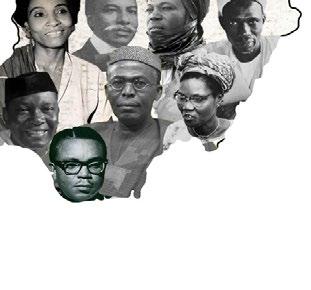








EFFECTIVE APRIL 1, 2024








N1, 550, 000
Double Spread Half Page N1, 200, 000 10X6 N700, 000
10X5 N650, 000
10X4 N600, 000
10X3 N500, 000
9X6 N440, 000
9X5 N395, 000
9X4 N335, 000
9X3 N310, 000

8X6 N410, 000
8X5 N380, 000




7X5 N320, 000
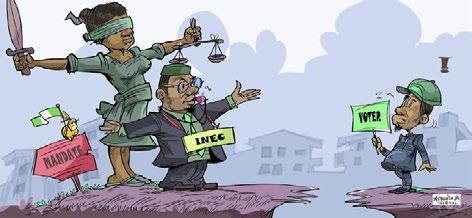


7X4 N315, 000
6X5 N280, 000

6X3 N145, 000
6X2 N85, 000
5X2 N70, 000
4X4 N160, 000
4X3 N95, 000
4X2 N65, 000
3X3 N60, 000
3X2 N50, 000
2X2 N30, 000
2X1 N15, 000 1X1 N7, 000











D V E R T I S E M E N T R A T E
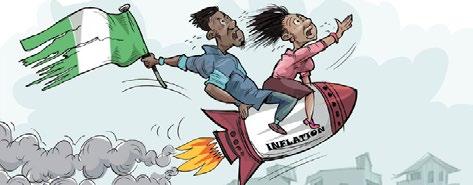


Front Page Strip– 4x6 – N1, 400, 000
Front Page Strip 3x6 – N800, 000
of Name (Classified) N5, 000

























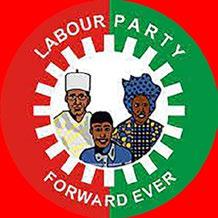
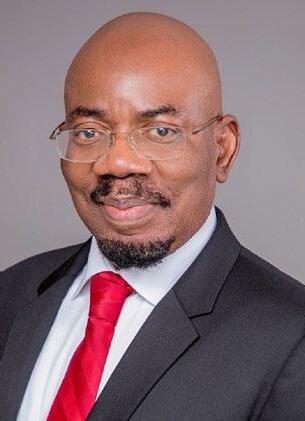
JEDITOR Ivory Ukonu

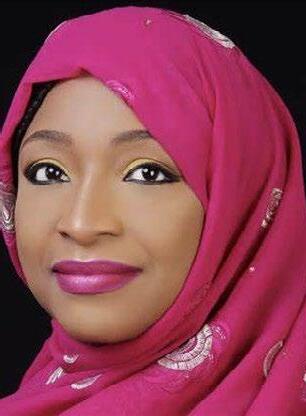




Some women dream of marrying a king so as to enjoy the perks of royalty, such as power, wealth, prestige and a life of luxury. For Olori Ronke Ademiluyi-Ogunwusi, the fifth wife of the Ooni of Ife, Oba Enitan Adeyeye Ogunwusi, a fascinating journey of friendship and understanding was just enough to take the plunge. In this interview with IVORY UKONU, she talks about her marriage and passion for promoting African fashion through carefully curated international fashion shows and youth empowerment projects. Excerpts:
Asan entrepreneur who is also a royal wife, how are you able to combine your duties in both roles?
I am saddled with many responsibilities and expectations, which could overshadow my personal desires and dreams, if I am not careful. I am expected to serve the people, nurture and offer them value. So I just try to combine my royal duties and my entrepreneurial duties as well. And sometimes they’re interwoven because my royal duties are about ensuring that all the members of my community, especially the women and the youth, are okay. Looking at the challenges some of them face and seeing how I can support them as their royal mother. So, sometimes these duties are interwoven.
What is your role as the global ambassador of Queen Moremi Ajasoro Initiative and as the creative mind behind 'Moremi the Musicals'?
'Moremi the Musicals' is a stage show which dwells on the life of Queen Moremi, a legendary Yoruba queen and folk heroine who assisted in the liberation of the Yoruba kingdom of Ife from the neighbouring Ugbo Kingdom. 'Moremi the Musicals' tells the story of Moremi in a way that it appeals to the new generation of millennials. My role as the global ambassador, having founded it in 2016 under the House of Oduduwa Foundation, the Ooni of Ife, is to collaborate and create strategic ideas to enhance the brand. To inform the younger generation about the role that Queen Moremi played to seek global partnership.
Queen Moremi's story is that of great bravery and leadership. What makes it unique is that she was a woman. So, we are using the account of Moremi, and reinventing it in a way that it is appealing to the younger generation. We want them to see her as a role model; we want her story to impact them, we also want to use it to encourage young women to take up leadership roles because she was a great leader, a true leader.
Great leaders will always put the love of their people and their countries before themselves. That is what Moremi did. We are trying to encourage that in the society. To achieve this, we have a lot of projects that are ongoing. We started with the cultural and leadership pageant in 2016 and in 2018, in collaboration with the Obafemi Awolowo University we launched the book on Queen Moremi Ajasoro, which we intend to distribute to schools across Nigeria as a literature book. Moremi the Musical is the third project that we have done to raise awareness around it. We also just launched the Moremi barbie doll. The story of Moremi happened 1,700 years ago. So, if you are telling a child of five or 10 years about a story that happened 1,700 years ago, they are not going to be interested. You have to tell it in a way that it appeals to them.
You are also the founder of Africa Fashion Week London/Nigeria. What prompted this project?
It is simply to showcase to the world thousands of African heritage brands from around the globe. The idea is to create a platform for African creatives to thrive. That is what Africa Fashion Week, London, AFWL and Africa Fashion Week Nigeria is all about, to showcase the beauty of Africa and everything we represent as a people to the world. Fashion in Africa is part of our DNA, it is our identity and so we must bear it with so much pride and showcase it with so much pride as well. The idea was born around 2010. When I came up with the idea, my husband, the Ooni of Ife, was one of the first people that I called, to see if it’s an idea that could actually work. And so we brainstormed and did a few events together. He’s always been a part of it. He might not have attended all of the events, but he’s always been a part of it, giving me ideas on how to take it further, innovation and all of that.
This year's edition is our 14th edition in London and our 10th in Nigeria. It’s all about promoting the creative talents out of Africa. Prior to us starting Africa Fashion Week London in 2011, there wasn’t a platform that showcased the greatness of our creatives in Africa. If you look at the work that they do; the artisans, the designers, the creatives, if you see the wonderful things they do, there must be a platform that showcases them. For creativity to grow, there must be a platform that showcases and promotes its growth. If you create something and leave it in your house without exposing it to the world, it’s not going to grow. Nobody’s going to know about it. At some point, you’re going to get so frustrated because when you create something, you’re driven by passion, but to enable it to become sustainable, to enable it to outlive you, one must commercialise it.
For this year's edition, AFWL is going to have about 55 designers from South Africa, Botswana, Benin Republic, Nigeria, Morocco and more to showcase their designs at the show. We have about 20 African countries that are going to be
represented. In addition to that, we have our exhibitors as well. This year and for the first time, we are also adding an Africa food village, about 10 countries are going to be showcasing various cuisines. It is going to cut across different foods from different African countries so that people can taste various foods from Africa.
We are also going to have a celebrity charity fashion show in collaboration with the Nelson Mandela Foundation in the United Kingdom. It will feature celebrity designers and stars on the runway. All these help to create visibility for designers beyond the catwalks.
With so many fashion shows in Nigeria, what is it you are doing different from the others?
Africa Fashion Week is the pioneer fashion week. When we started, there was no Africa Fashion Week both here in Nigeria and in the diaspora. The ones currently available in Nigeria emerged from the back of the Africa Fashion Week Nigeria. So we must have done something right for a lot of people to want to jump on the bandwagon and do what we are doing. We created a platform for established designers, aspiring and emerging new designers in the fashion industry. We run a comprehensive platform and we accommodate everyone who we think is interested in fashion and who has the possibility of making it in the fashion industry. The same thing with our models. Every year we have new models on the catwalk, fresh faces within the modelling industry that we discover and promote. So, for me, our platform is like a springboard, for models, makeup artists, hair stylists, for everyone who wants to have a place in the fashion industry.
You are also the Chief Executive Officer of the 'Adire' Oduduwa Textile Training and Production Hub in Ile-Ife. What do you hope to achieve with it in years to come?
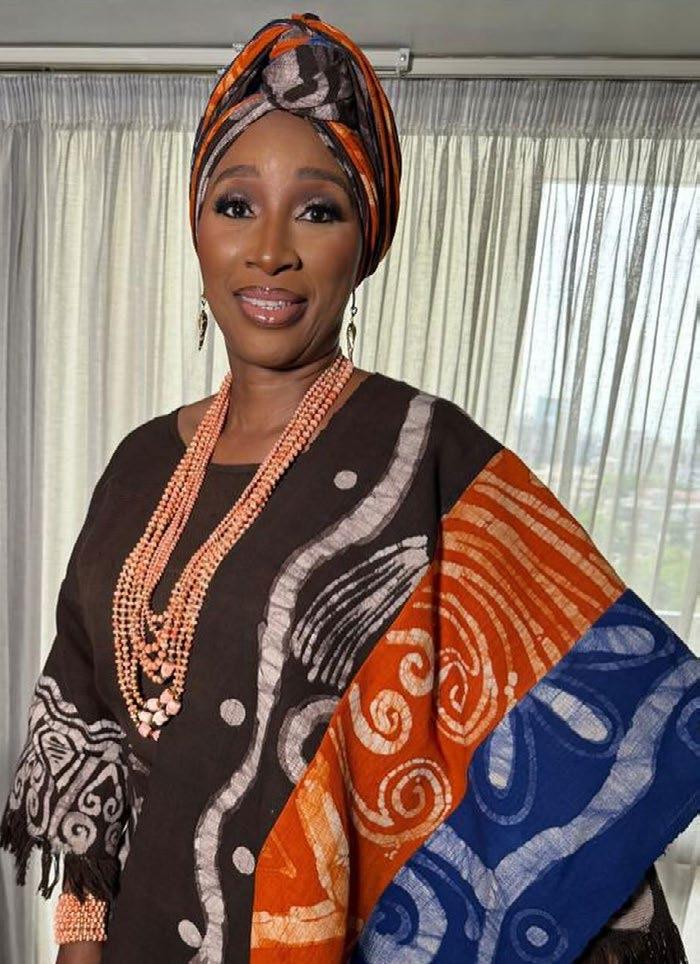
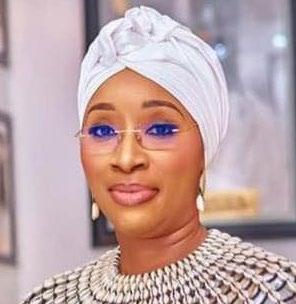
In 20 years' time, when I look back, I want to be considered or regarded as one of the gatekeepers of African or Nigerian culture via what I do, promoting our textiles and our fabrics. And it is very important because it’s part of our identity. For us, our textiles, our fashion, our fabric goes beyond just fashion statements. It is who we are. This is the right time for the government to key into it and see it as a wealth creation, poverty alleviation and job creation project that can benefit Nigeria and help grow our GDP and create jobs for our young graduates who come out of school with no work. What we do at the 'Adire' Oduduwa hub is to train women and young people in textile making; from the 'Adire Eleko,' 'Adire Oniko,' 'Adire Alabela,' the different techniques of making Adire so they can generate an income for themselves. We’ve trained over 1,200 people at the moment, courtesy of my husband who supports the training with funding. And right now, we’ve now graduated to another programme of taking youths on national service so that they can come and do their youth service with us. We pay them and we train them. We give them accommodation. We pay them for training to learn in Ile-Ife.
But 'Adire' is generally known as part of the culture of Abeokuta in Ogun State. Why is an 'Adire' hub sited in Ile Ife?
Well, the Egbas in Abeokuta made it popular. They became the commercial hub of it, but it actually originated from Ife because all the Yorubas are affiliated to Ife. During migration from Osogbo to Ibadan and other parts of South-West
Nigeria, it spread across. But what Abeokuta has done that is very unique is how they commercialised it.
How do you unwind when you are not at work?
I love to sleep. I try to sleep early, I sleep at about 9 pm, I enjoy my sleep. Most times I wake up in the middle of the night to work at about 3 am. After that I go back to sleep and wake up at about 10 O’clock in the morning.
Your fashion has since evolved and now you wear only traditional attires
It has. For someone who promotes African fashion, I shouldn’t be seen wearing something else. Maybe occasionally, I can wear English attires, but 90 o per cent of the time I wear an outfit that is made by African designers. I try to be patriotic. Every year, I discover new designers, but I have my favourites. I wear Ade Bakare, Sister by Eyoro, these are designers I have worn their outfit from 2018 to 2019. But I am very proactive, if I see something, I like it and I wear it.
What inspires you?
To be able to enjoy what I am doing, not to go in the same direction that everybody is going but to take a step back and see if it is right for me and do it. I am passionate about Africa, African stories and that was why we started the Africa Fashion Week, being able to express ourselves and our culture through fashion. I moved further working with the Ooni of Ife. So, we are both passionate about telling the African story.
How would you describe your marriage to a king who was previously married and currently has other wives?
I knew the Ooni a year before he became King in 2015. We remained friends and got married in October 2022. We’ve been friends for 10 years and this year, we are celebrating 10 years of friendship. I have witnessed his two sides; before he became king and after he became king. Being married to him is bliss. It’s been good. It’s different, but it’s been good. So, my union with him is more of a friendship. So, in that regard, it’s been good.


IVORY UKONU
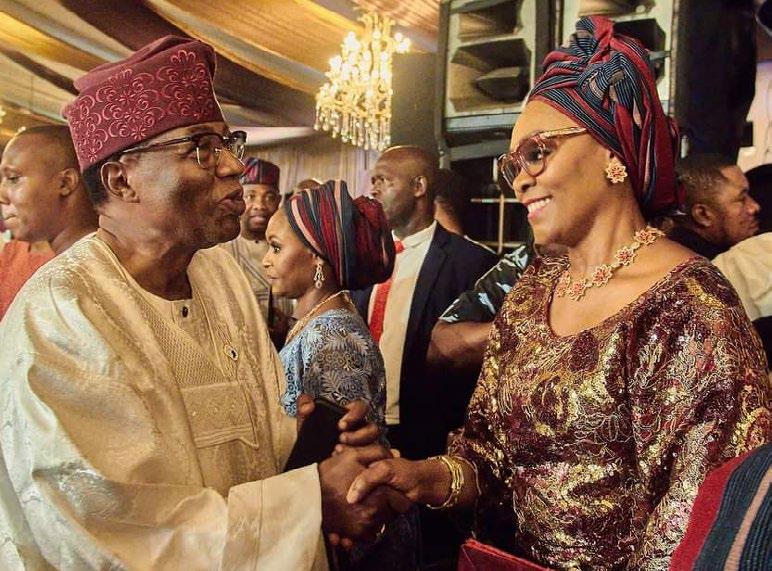
Senator Gbenga Daniel has continued to show that he is a gentleman. Although he recently made an attempt to extend the olive branch to the Governor of Ogun State, Dapo Abiodun, by commending him over the recognition of the state’s oil production status, while also appealing for the governor's support in revitalising Gateway Industrial and PetroGas Institute (GIPI) in the state and support its revitalisation in order to take advantage of underutilised development, it seems that Abiodun isn't interested in sheathing his sword. But this has not stopped Daniel, who represents Ogun East Senatorial Zone, to remain cordial with Bamidele, the First Lady and to keep her out of his raging quarrel with her husband. On several occasions, Daniel has had cause to run into the First Lady at events, but rather than ignoring her, he has made it a point of duty to always exchange warm greetings with her.
Continued
Senator Daniel’s wife, Yeye Olufunke, also doesn't hesitate to exchange hearty greetings with the first lady, not minding the rancour between the state governor and her family. The first lady on her part has always reciprocated such gestures, regardless of her husband's stance against the Daniels. This scenario played out again at a recent high-profile wedding that took place in Lagos. Many observers were happy that the Daniels and even the first lady didn't allow pettiness get the better of them.
Recall that both Abiodun and Daniel have been at loggerheads over political appointments and positioning for over two years. Matters came to a head when Yeye Olufunke's multi-storey plaza was demolished by Abiodun over claims of environmental infraction. Before things went south between them, Daniel was a major player in the coalition of political forces that helped Abiodun secure his first term as governor in 2019.
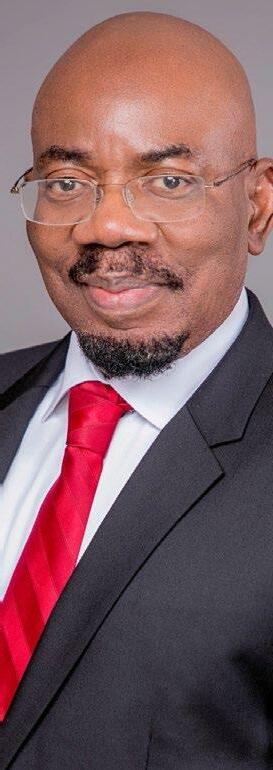
JIM OVIA STEPS OUT OF HIS
The city of Ilorin, Kwara State hosted some dignitaries last week as Justice Salihu Moddibo Belgore and his wife, Hajia S’adatu Arin Gobir gave out their daughter, Aisha Oyinkansola’s hand in marriage to her lover, Abdulmalik Temitope, the son of Engineer Ahmed Kola Ibrahim. Guests trooped in from far and near to celebrate with the eminent jurist and his family during the colourful wedding that spanned one week. The nuptials started on Monday, July 8 with a bridal shower for Aisha. This was followed by a welcome party for the couple the next day. The party was held at the popular Flower Garden in Ilorin. The next day at the same venue, the bride’s henna party, a strictly-women and pink affair, took place. The day was rounded off with a Mothers’ Night. The day after was the traditional wedding ceremony. On Friday, a dinner party was hosted in the couple's honour and on Saturday, their Nikai and main wedding took centre-stage.

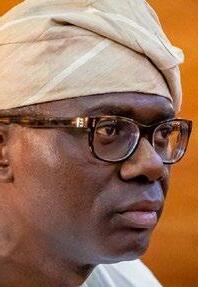
is expected to provide strategic guidance and advocacy at the highest levels, ensuring that the objectives of the Creative Africa Programme are met with resounding success. Musawa is reportedly set to grasp this opportunity to drive significant growth within Nigeria’s cultural and creative industries, further cementing Nigeria’s status as a global creative hub. By joining CAAG, the Honourable Minister reaffirms the Ministry’s commitment to fostering a robust and dynamic creative sector that showcases Nigeria, and Africa’s, rich cultural heritage, and developing a comprehensive ecosystem where Nigerian creatives can thrive.
The African Export-Import Bank’s unrivaled track record on providing strategic direction to the African continent will provide the ideal forum in which to develop the international competitiveness of Nigerian creative enterprises. This collaboration promises to unlock new financing avenues, technical support, platforms and much more, that will invigorate the creative sector, facilitating crosscontinental trade and ultimately usher in a new era of transformative success for the creative industry, thereby delivering on key aspects of His Excellency, President Bola Ahmed Tinubu’s renewed hope agenda.
at the traditional wedding party of Hon Muktar Tolani Shagaya, son of businesswoman Bola Shagaya to his wife, Ayotola Oluwatoyin Odebiyi in Lagos last weekend got many people, particularly guests doing a double take. Some weren't quite sure he was the one and were a bit sceptical about walking up to him to exchange pleasantries, but others mustered up the courage to look him in the eye in order to satisfy their curiosity. Their reactions were quite understandable. Being a lone wolf and very unlike his contemporaries who enjoy the limelight, Jim is to put it mildly, a recluse. He abhors the limelight and prefers to operate from behind the scenes. He hardly attends events, makes very few and far between public appearances only for the promotion of his businesses and hardly grants media interviews. In this age of social media and over-exposure, he has no personal social media account, save for the promotion of some of his numerous businesses. He follows in the footsteps of business mogul, Mike Adenuga who has built a public persona defined by near invisibility. He was dressed to the party in a simple traditional attire and a bowler hat to match, he was accompanied to the party by the managing director of his bank, Dame Adaora Umeoji who looked stunningly breathtaking.



Prince Rasaq Musa Adebamowo from Ewade royal family was nominated as the new king, but his coronation was delayed by the legal battle. With the Supreme Court's affirmation, his coronation will hopefully be done speedily.
he Supreme Court of Nigeria has struck out an appeal filed by Micheal Onakoya against the decision of the Lagos Division of the Court of Appeal which affirmed the judgment of the lower court that dethroned him as the traditional ruler of Igbooye land, Epe. In a recently delivered judgment in suit SC//CV//969/2024, by a panel of judges comprising Justice Adamu Jauro, Justice Chidiebere Nwaoma, Justice Obande Festus Ogbuinya, Justice Stephen Jonah Adah and Justice Mohammed Baba Idri, all of the appellate court, held that the appeal was filed out of time. The ruling of the Supreme Court was read by Justice Jauro, the presiding justice. The 1st to 6th respondents in the appeal were represented by Babs Animashaun, and the 7th respondent was represented by Prof Yusuf Ali (SAN) with Adams Olori Aje, Alex Okoja, Sefinat Lamidi and Kehinde Salimon. The 8th and 9th respondents were represented by A.O. Muheed, a Deputy Director with the Lagos State Government and Florence Pius Anyador, a Chief State Counsel and O. Osusanya, an Assistant Chief State Counsel. The Court of appeal, Lagos Division had in March 2020 affirmed the judgment of a Lagos High Court sitting in Igbosere which dethroned him as the traditional ruler and Orijeru of Igbooye land, Epe. Dissatisfied, the deposed king had approached the Court of Appeal and sought the order of the court to set aside the judgment of the lower court delivered on April 19, 2016, by Justice Iyabo Kasali. But the court in a unanimous decision, dismissed the appeal filed by the deposed monarch. The Lagos State government had on May 17, 2016 banished the deposed monarch from Igbooye town following the two judgments after his dethronement as the Orijeru of Igbooyeland, Epe. However, following his appeal to the state government, his banishment was reviewed and he was allowed to return home in April 2017, but with instructions that his return should not incite the breakdown of law and order, or in any way disturb the peace of the community.

Archbishop Sam Zuga, the General Overseer and founder of House of Joy Ministry, President and founder of SamZuga foundation and the founder of the first digital currency in Africa, Zuga Coin, has scored another first. The cleric has broken new grounds yet again with the launch of SamZuga GPT, a revolutionary initiative he claims is aimed at combating poverty through blockchain technology, artificial intelligence, and the digital economy.
He claims that SamZuga GPT is a groundbreaking solution to Africa’s longstanding poverty crisis having envisioned a future where poverty in Nigeria and Africa becomes a thing of the past. According to him, SamZuga GPT, the world’s first independent cryptocurrency bank powered by artificial intelligence, is designed to address two major issues: To solve the problem of cryptocurrency volatility. The falling and rising of the cryptocurrency market will not affect investors. It will also help one accumulate wealth without work. There is no third-party involvement in the Samzuga GPT. Samzuga
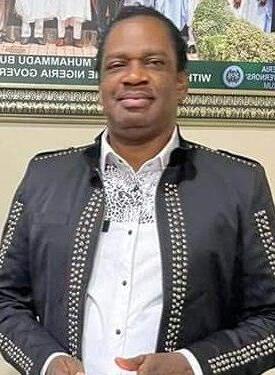
GPT works strictly on the referral system. Hopefully, SamZuga GPT doesn't end up like Zuga Coin that got him battling to save his reputation. A few months ago, there were reports that Zugacoin and all that it represents is allegedly fraudulent. Some users and merchants of Zugacoin at some point battled with the challenges relating to their inability to withdraw their digital assets. Hence, industry critics believed that the Nigerian digital currency should be avoided by all means. Those who are well


kicking off the year with programmes like the OMD Academy and Digital Marketing Bootcamps.
The duo added that they were also guided by mentors during the national competition, who were former Young Lions Champions. Notably, OMD has represented Nigeria 11 times at the Cannes Young Lions Media since 2008 and was the first African agency to make the top six in 2022. The judges were impressed by the Africanness of Quadri and Ngozi's story. "Being a global competition shouldn’t rob us of our originality," said
This feedback highlighted the importance of authenticity, even on a global stage. Quadri emphasized the value of being original and not intimidated by counterparts from developed countries with advanced technology and media opportunities.
"We told our African story despite being on a global stage. Being in the top six is just the beginning, and we hope it inspires us and our colleagues to aim for gold next
versed in the business of cryptocurrencies advised that investors need to think twice before committing financially to Zuga coin, saying that they risk losing their investment if they commit to it. These critics also claim that Zuga coin is not yet an authority and is not supported by any of the giants in the cryptocurrency exchange platforms like Binance, coin base, and Huobi Global. While a few unpopular exchange platforms support Zuga coin, one of the platforms made it clear that users might not be able to trade Zuga coin for other coins. Another worrisome thing about the coin is its price. Most cryptocurrencies like bitcoin, Ethereum, dogecoin, and others start below $1 and grow over the years to what it is today. Zuga coin started at a very ridiculous price of nearly $50,000. Over time, it dropped in value and at another time, rose again to almost N66,000,000, far ahead of Bitcoin the premier cryptocurrency and the world's most recognised, at N17,000,000. Despite this huge breakthrough the coin, critics allege, is still not recognized, not even at the national level, a huge discouragement for investors and crypto traders, they insist.
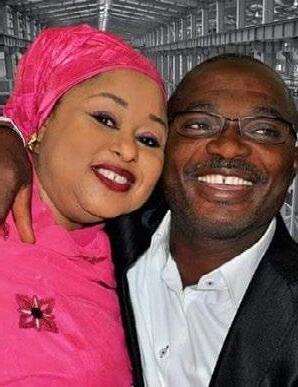
The Yusufs
A few years later, Kam received a major breakthrough in the form of a credit facility worth N500,000 from Oscar James, a foreigner who was a wire rod wholesaler and nail producer in Kwara, which he used to purchase wire rods for making nails. He made N200,000 monthly from the loan and he bought his first house and married his wife who aggressively pushed her husband's goods into new regions. She would drive their only pickup truck from Kwara south to push their products into the larger markets of Ibadan, Oshogbo and Lagos. It is an arrangement that still stands today. She handles the marketing while Kam handles the manufacturing. When Oscar James exited the Nigerian market in 1996, Kam acquired three of their nail-making machines. While the acquisition was a net positive, it brought on a new set of challenges, mostly in the form of competition from more established players in the nail-making industry. Nail producers for whom he had once distributed refused to supply him with raw material. His income vanished; but this hardship provoked a new level of exploration and discovery as he learned how to innovate. He had to develop himself and was compelled to design the machine himself so he could buy wire rods somewhere else and process them into the hoarded drawing wire himself. He built his first drawing machine himself after many rounds of trial and error, employing a basic knowledge of rotors, gears, mechanics and power. The self-taught engineer with the support of his wife, succeeded in turning the N10,000 he got from his uncle into over a $300-million industrial conglomerate. And he did so without political connections supposedly or even a high school education. He attributes the rise of Kam Industries to aggressive manufacturing, hard work and good old-fashioned entrepreneurship. Kam Industries employs around 200 female workers. According to him, the idea came about after numerous trips to source raw materials in China, where Kam noticed most of the machine operators were women. Though his initial purpose was simply female empowerment, Kam prefers the female workers as he says they’re trustworthy and stable.
Photo Editor: Peace Udugba [08033050729]

Professional Fighters Leaque (PFL) Welterweight Champion, Maxwell Djantou Nana of PFL, Lightweight Champion, Shido Boris Esperanza;
Marketing, MultiChoice Nigeria, Tope Oshunkeye; Chief Executive Officer (CEO), PFL, Pete Murray; Co-founder and Managing Partner of Helios Investment Partners, Tope Lawani; PFL Welterweight
Kunle Lawal and PFL Strawweight Champion, Juliet Ukah, at the Professional Fighters League (PFL) Africa Launch at the Civic Centre, Victoria Island, Lagos on July 10, 2024.
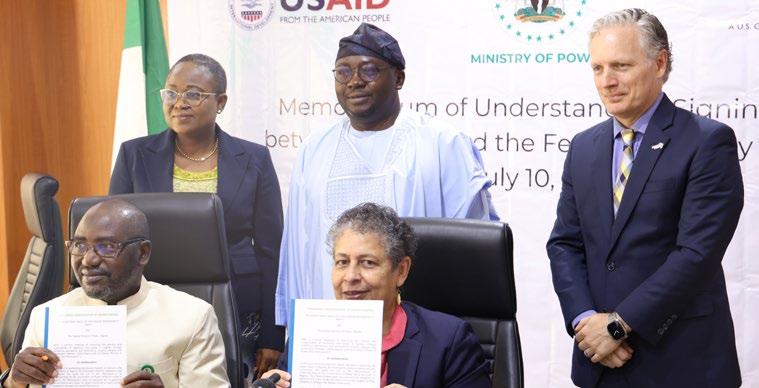
L-R (front row): Permanent Secretary, Ministry of Power, Mahmuda Mamman; USAID/Nigeria Mission Director, Melissa A. Jones, (backrow L-R): Director, Ministry of Power, Bosede Olaniyi; Minister of Power, Adebayo Adelabu and the Power Africa Coordinator, Richard Nelson during the signing of the Memorandum of Understanding between the ministry and USAID in Abuja July 10, 2024.
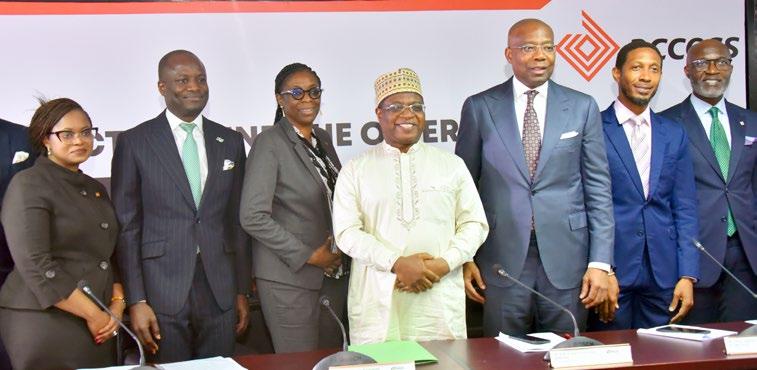
L-R: Group Chief Financial Officer, Access Holdings Plc, Morounke Olufemi; Group CEO, Nigerian Exchange Group (NGX Group), Temi Popoola; Acting Group Managing Director /Chief Executive Officer, Access Holdings Plc, Bolaji Agbede; Chairman, Access Holdings Plc, Umaru Kwairanga, Group Chairman, NGX Group; Aigboje Aig-Imoukhuede, Chairman, Nigerian Exchange Limited, Ahonsi Unuigbe and ExGroup Managing Director/CEO, Access Bank Plc, Roosevelt Ogbonna, during the Facts Behind the Rights Issue Presentation by Access Holdings Plc, at the NGX in Lagos on July 9, 2024.
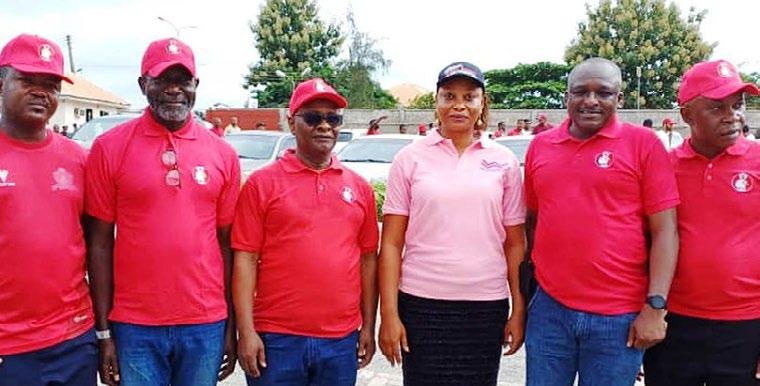

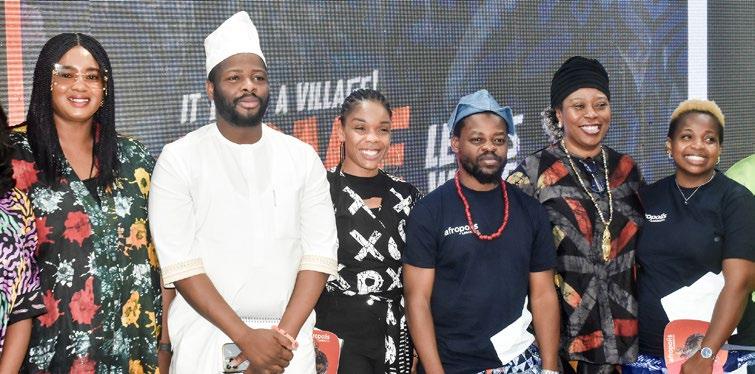
L-R: Executive Secretary, Lagos State Film and Video Board, Mrs Adebukola Agbaminoja; Special Adviser to the Governor of Lagos State on Tourism Arts Culture, Mr Idris Aregbe; Chief Executive Officer, Kaffy Krative, Dr Kafayat Shafau;
and
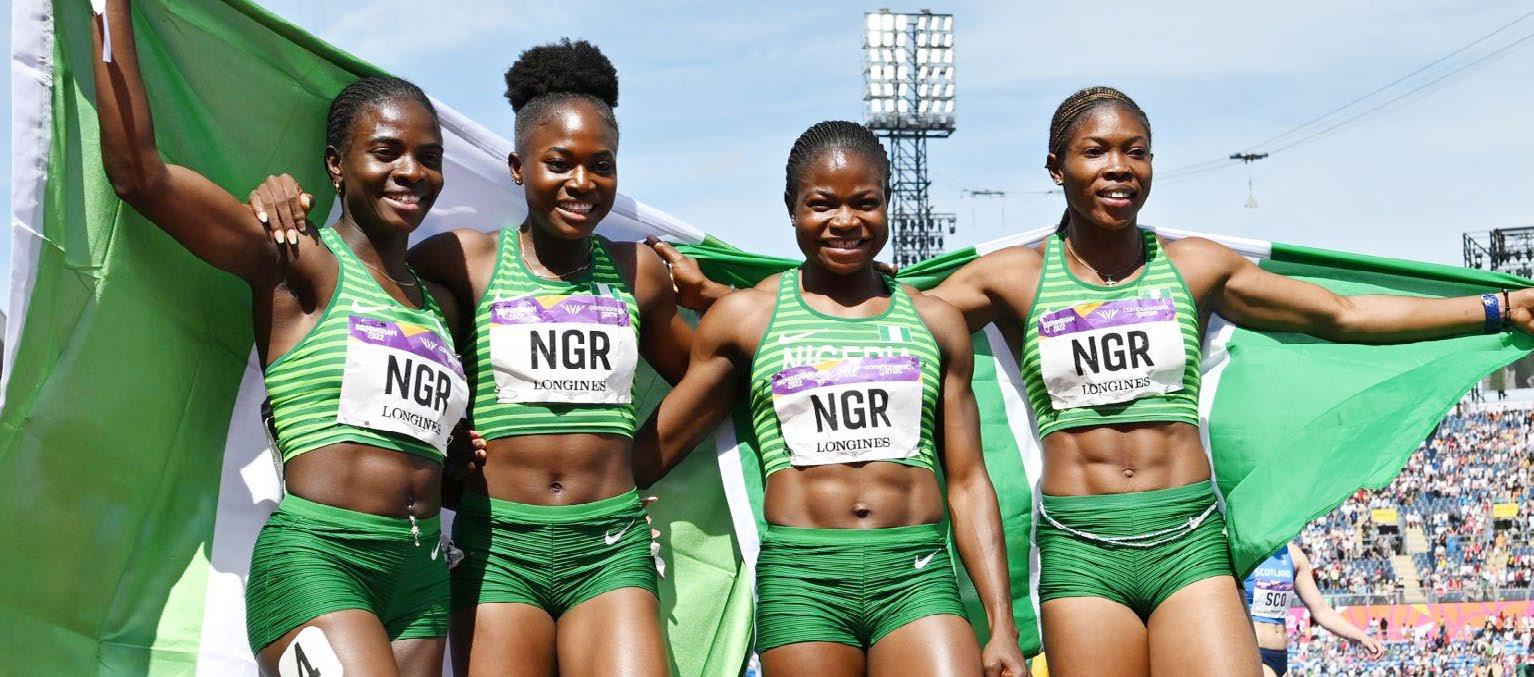
BY JUDE OBAFEMI
In November 2023, the World Anti-Doping Agency (WADA) made a significant decision to include Nigeria in its list of non-compliant countries. This development, based on Nigeria's failure to address critical requirements from a 2022 WADA audit, has profound implications for the country's sporting landscape, particularly as it prepares for the Paris Olympics.
The gravity of this situation becomes apparent when

examining its origins. In late 2022, WADA conducted an audit of Nigeria's anti-doping programme. The results revealed substantial shortcomings. Several critical requirements were identified, issues that demanded immediate attention to ensure compliance with international standards. However, as months passed, these requirements remained unaddressed, leading to WADA's decision to place Nigeria on its noncompliance list.

Court of Arbitration for Sports
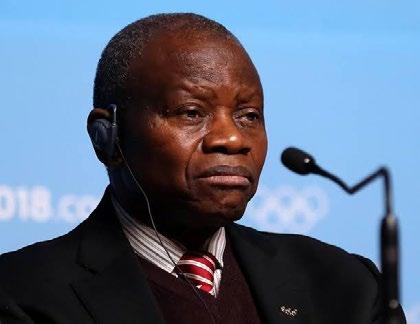
This is not a minor infraction. The implications of this non-compliance are far-reaching and potentially devastating for Nigerian sports. If the Court of Arbitration for Sport (CAS) upholds WADA's decision, Nigeria could face severe consequences. These may include prohibitions on hosting major sporting events and, more alarmingly, the possibility of Nigerian athletes being barred from competing under the national flag at international competitions, including the upcoming Olympics.
Consider the potential scenario: Nigerian athletes, who have dedicated years to rigorous training, stepping onto the Olympic stage without their nation's colours, unable to see their flag raised or hear their anthem played even in victory. This prospect strikes at the core of national pride and athletic aspiration.

This crisis has also ignited a broader conversation about the state of sports governance in Nigeria
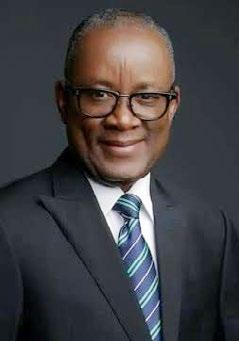
Nigeria's predicament shares striking similarities with that of Venezuela. Both nations find themselves at odds with WADA for failing to meet key anti-doping requirements. Venezuela's case stems from inadequacies identified in the Code Compliance Questionnaire exercise. Like Nigeria, Venezuela disputed WADA's allegations, leading to the matter being referred to CAS.
The parallel between these two cases highlights a concerning trend in international sports governance. It raises questions about the challenges developing nations face in implementing and maintaining sophisticated anti-doping programmes. Are these countries struggling due to lack of resources, expertise, or perhaps a combination of both? Or is there a deeper issue at play, one of prioritisation and understanding the critical importance of anti-doping measures in
the services of three international lawyers to defend its case before CAS. These legal experts, along with top officials from the Sports Ministry and other government agencies, have already made their way to Lausanne, Switzerland, where they will present Nigeria's case.
The stakes are immense. A ruling against Nigeria would not only be a blow to national pride but could also have far-reaching consequences for the country's athletes. The inability to compete under the Nigerian flag at the Paris Olympics would be a profound disappointment for athletes who have spent years preparing for this moment. More than just a symbolic loss, it could potentially impact athlete morale and performance.


ogannah@thewillnews.com
Nigeria, once Africa's largest crude oil producer, finds itself in a paradoxical situation that has persisted for decades. Despite its vast oil resources, the country continues to import nearly all of its refined petroleum products, a reality that stands as a stark reminder of years of mismanagement, corruption, ineptitude and unfulfilled promises.
The latest chapter in this ongoing saga unfolded in December 2023 when the Minister of State for Petroleum Resources (Oil), Heineken Lokpobiri, announced the "mechanical completion" of repairs at the state-owned Port Harcourt refinery. Nigerians were assured with great fanfare that the facility would soon roar back to life, processing at least 60,000 barrels of crude daily into much-needed petrol and other products and ramping up production to its 210, 000 bpd capacity. However, six months later, the refinery remains silent, unable to produce even a single drop of petrol. The familiar cycle of excuses has begun anew, with talks of "regulatory approvals" and vague assurances that operations will commence "very soon."
This scenario is all too familiar to Nigerians, who have heard similar promises repeatedly over the years. Nigerians are exhausted, frustrated and tired. The patience of the populace has worn thin with the Nigerian National Petroleum Company Limited, NNPC, and scepticism has replaced hope.
The economic cost of Nigeria's refining deficit is staggering. In 2021 alone, the NNPC spent N83 billion on maintaining non-functional refineries. Hundreds of billions of naira are still stolen through inflated quantities of petrol imported into the country by the company and the Federal G overnment still has to pay subsidy on this fraud. Simultaneously, billions of dollars in precious foreign exchange are lost annually to fuel imports, leaving the economy perpetually vulnerable and struggling.
The human cost of this dysfunction is even more severe. Ordinary Nigerians bear the brunt through high fuel prices, which ripple through the economy, driving up the cost of food, transportation, and basic goods. The recent removal of fuel subsidies, while economically necessary but implemented without a proper strategy, has only exacerbated this pain.
The persistent failure to revive the refineries over the years, despite billions of dollars invested in repairs, points to deep-rooted issues within the oil sector. The continuous cycle of rehabilitation contracts, each more expensive than the last, yielding little tangible results, points to corruption and crass ineptitude by the management of the NNPC, the Ministry of Petroleum Resources and the Presidency.
A former Governor of the Central Bank of Nigeria and current Emir of Kano, Sanusi Lamido Sanusi, highlighted the scale of this problem as far back as 2013. He pointed out that between 2009 and 2011, the subsidy payments jumped from N291 billion to N2.7 trillion, an increase that could not be explained by any reasonable increase in consumption or population.
The situation has only worsened since then, with
subsidy payments reaching between N3.7 trillion to N4 trillion in 2023 under the administration of President Muhammadu Buhari.
The $1.5 billion contract awarded in 2021 for the rehabilitation of Port Harcourt refinery was meant to signal a new dawn. Italian firm Maire Tecnimont was tasked
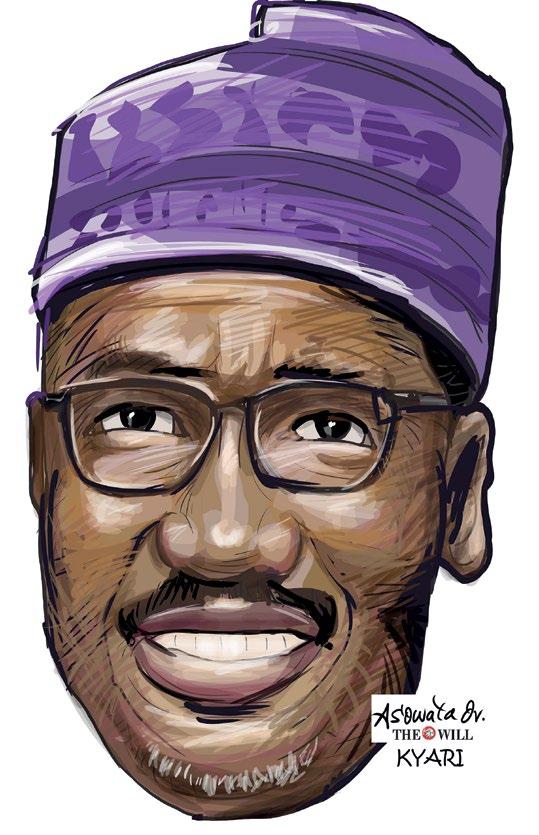
with executing the project within 18 months, promising 90 percent production capacity by the end of 2023. Yet, past midway through 2024, the nation is still waiting for results. It's the same excuse for the comatose Warri and Port Harcourt refineries.
The impact on Nigeria's economy cannot be overstated. With an average monthly consumption of 1 billion litres,
the country spends approximately N520 billion on petrol imports every month. This translates to an annual import bill of around N6.2 trillion - funds that could be better invested in infrastructure, healthcare, and education.
The dysfunction in the refining sector also has broader implications for Nigeria's energy security and economic sovereignty. As long as the country remains dependent on imported fuel, it will never be able to develop and will continue to enrich the cartel that steals billions of naira daily through the fuel import scheme of the NNPC. The situation is particularly frustrating, given Nigeria's vast oil resources. With proven crude oil reserves of 37 billion barrels, the country should be a net exporter of refined products, not an importer. The failure to harness these resources effectively represents a monumental missed opportunity for economic development and job creation. Why the NNPC is still under government control is frustrating with its very poor record over the years. The Federal Government ought to have sold its majority stake to the private sector and retained 30-40 percent equity.
For starters, Mele Kyari, the current head of the NNPC should be removed from his job for the NNPC’s sustained incompetence since he assumed office in July 2019. It is on record that in over three years the NNPC has not contributed anything significant to the national purse where funds are disbursed to fund both federal and state budgets. Under his watch, crude production has largely remained stagnant averaging 1.2m bpd despite assuming office when production was averaging 1.9m bpd. There has also been no significant investment in the sector from the major oil companies because they have lost confidence in his leadership at the helm of the NNPC.
Leaders must be held accountable for their stewardship. Nigeria has reached a point where we should have zero tolerance for incompetence in public office, just like it is done in the private sector and in countries where the government performs.
Recent challenges faced by the new Dangote Refinery in securing local crude supply further highlight the complexities of Nigeria's oil sector. Despite the Petroleum Industry Act mandating that international oil companies meet local demand before exporting, there are reports of reluctance to comply. This raises questions about the enforcement of regulations and the alignment of various stakeholders in the industry.
As Nigeria grapples with these challenges, there are calls for a more radical approach to solving the refinery conundrum. Some experts argue that privatisation might be the key to turning around the fortunes of these stateowned facilities. Others advocate for greater transparency and accountability in the management of the refineries, involving regular public audits, clear performance metrics, and consequences for missed targets.
*Continues online at www. thewillnews.com
For starters, Mele Kyari, the current head of the NNPC should be removed from his job for the NNPC’s sustained incompetence since he assumed office in July 2019. It is on record that in over three years the NNPC has not contributed anything significant to the national purse where funds are disbursed to fund both federal and state budgets